The new features in this month’s Blackboard’s upgrade will be available from Friday 6th February. This month’s upgrade includes the following new/improved features to Ultra courses:
- Automations
- Ultra document enhancement
- Convert a Word/PowerPoint/PDF file to an Ultra document
- Ultra Course Awards 2026
- H5P, Xerte, Video Showcase – Call for presenters
Automations
Automations allow staff to configure triggers that prompt NILE to email students automatically when certain criteria are met. Following the upgrade staff will be able to set up automatic congratulatory emails for students who have achieved above a specified threshold on assessments, and to send supportive emails for those who have scored below a specified threshold. Staff can also send reminder emails to students who have unread feedback, although please note that this applies only to Blackboard assignments, not Turnitin assignments.
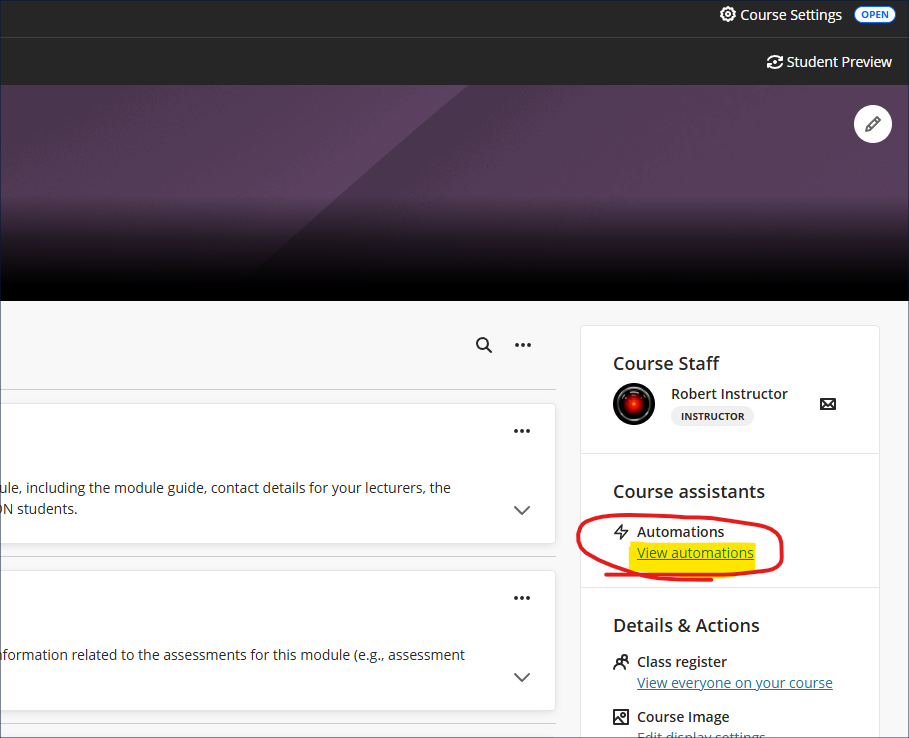
Note that congratulatory/supportive automations are only triggered by posted marks in the gradebook. Unposted marks will not activate the trigger. For example, if a student takes a formative test and receives their mark immediately upon completion of the test, an automation linked to completion of that formative test would be triggered immediately. However, if a student submits a manually marked assignment and receives a grade for it, an automation linked to that assignment will not be triggered when the mark is entered, only when the mark entered is actually posted.
For more information about automations see: Blackboard Help – Automations
Ultra document enhancement
February’s upgrade includes an enhancement to Ultra documents entitled, ‘Stack blocks vertically in documents’. How this improves Ultra documents is as follows. Currently, if you have made use of multiple columns in an Ultra document you may have found that each column can only contain one block. In the following example you can see that the first row of my Ultra document (which contains the blocks titled ‘1. One’, and ‘2. Two’) has been divided into two columns which take up, respectively, 1/4 and 3/4 of the horizonal screen space. This has left me with a lot of space underneath block ‘2, Two’, but if I want to move any blocks underneath ‘2. Two’, I cannot do this as a column can only contain one block. I can, of course, take the text from other blocks and copy and paste it into the ‘2. Two’ block to fill up the space, but this is time consuming, and also frustrating if I just want to try out some different layout options.
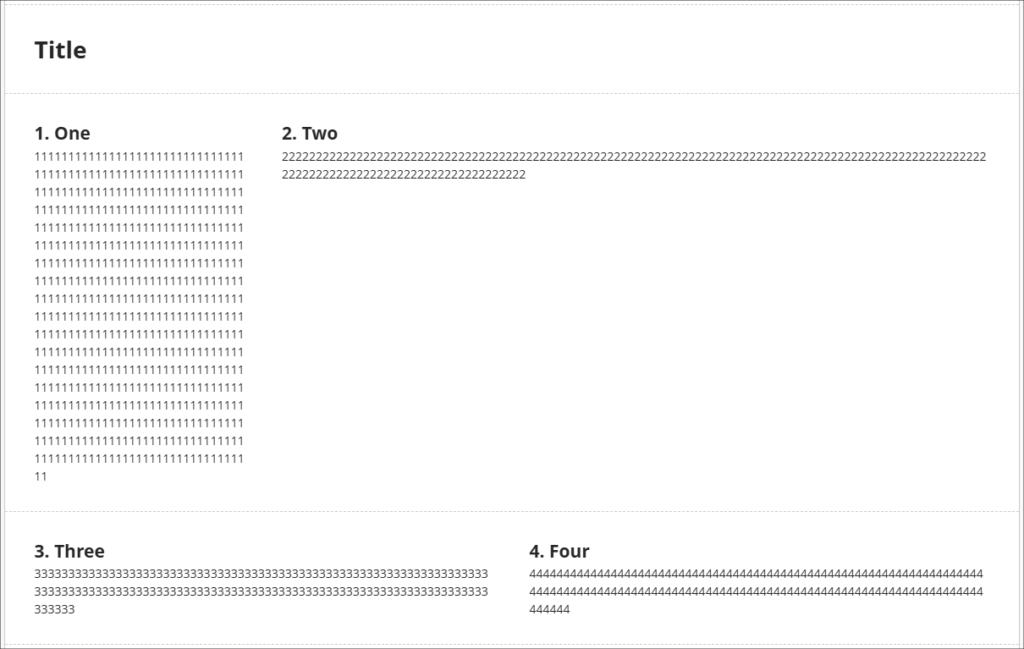
The ‘Stack blocks vertically in documents’ upgrade means that a column can contain multiple blocks, so after the upgrade I can now fill the space under ‘2. Two’ with additional blocks by dragging and dropping them in place.
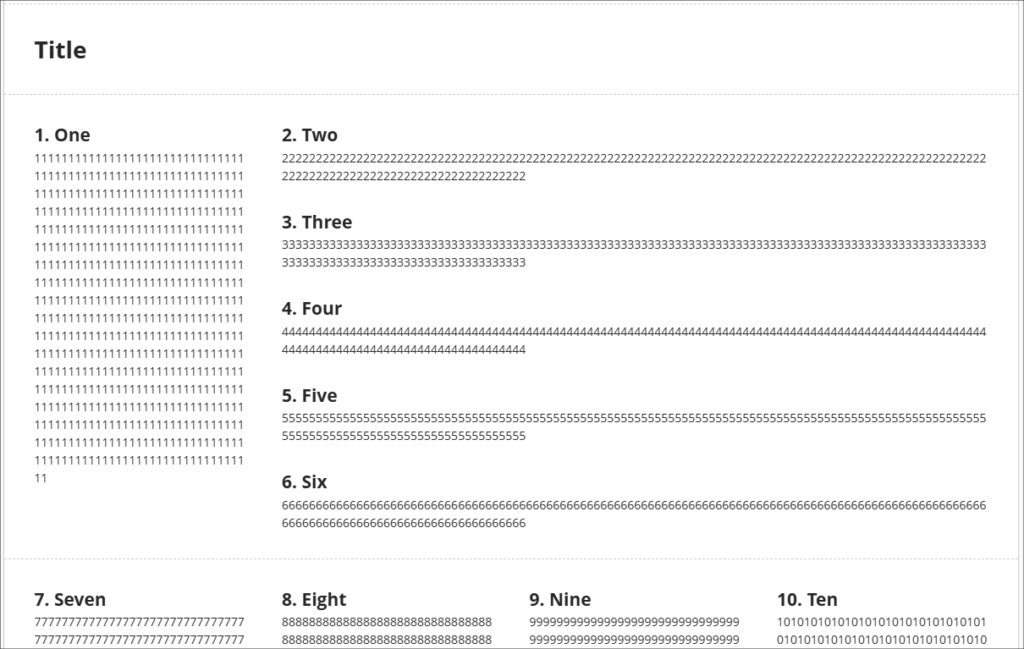
However, do bear in mind that once in a column together the blocks will share the same screen width. So, if I adjust the width of block ‘2. Two’ I will also adjust the width of all of the blocks in that column.
Also important to bear in mind that while your layout choices will be respected while students view Ultra documents on their laptops/desktop, on mobile devices the blocks will resize and flow into a single column, so instructions such as ‘immediately above/below’, or ‘to the left/right of’ will not necessarily make sense to all users. So, for example, rather than referring to an image as being on the right, it would be better to title the image (e.g., Fig 1.) and refer to the image by it’s title than by its relative position.
In the following screenshot you can see how students view the same page on a laptop (shown on the left) and on a mobile device (on the right).
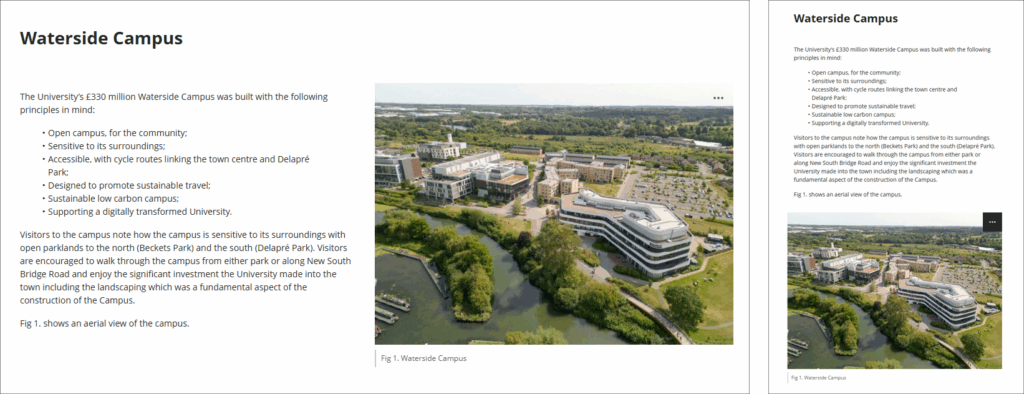
In case it’s helpful to know, when using multiple columns, the blocks always reflow in a simple, predictable matter, from the first row, first column, first block, i.e., the block in the top left position, down the column if there are multiple blocks in the column, but not crossing into the next row, then to the next column(s) on the right in that row. Once there are no more blocks in the row, the next row and the columns therein are selected, and so on. The following (rather roughly annotated) image shows an example of how an Ultra document with a complex layout on a laptop (the image on the left) will reflow when viewed on a mobile device (the image on the right).
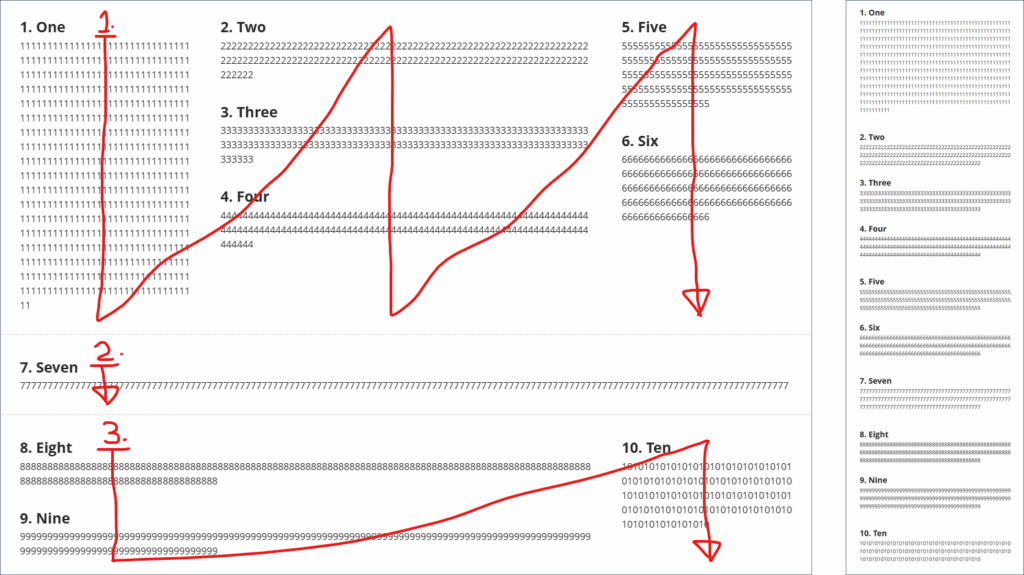
If you’d like to see how this works, you can view a video demonstration here: Blackboard Upgrade – February 2026 – Stack Blocks Vertically in Columns in Ultra Documents (video, 4m 22s)
More information about using Ultra documents is available from: Blackboard Help – Documents
Convert a Word/PowerPoint/PDF file to an Ultra document
Okay, so this one isn’t actually new, but it’s pretty good and I get the impression that not too many people know about it, so here it is again. Long story short – you have various Word, PowerPoint, and PDF files in your Ultra course, and you’d really like them to be Ultra documents* but you don’t have the time or the patience to laboriously copy and paste everything into Ultra documents, so wouldn’t it be great if there was the option to auto-convert Word/PowerPoint/PDF files to Ultra documents …
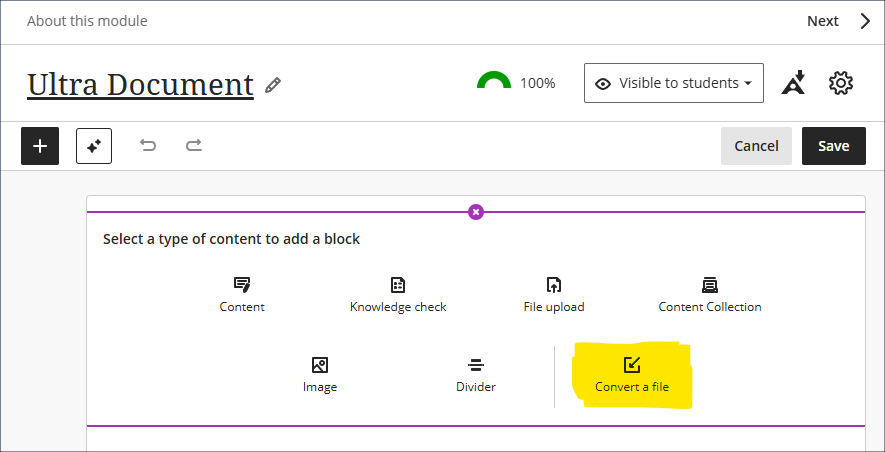
*The key reasons that you’d really like them to be Ultra documents, of course, is because this not only makes them look better, but it makes them much more accessible and mobile friendly, and really easy for students to access in alternative formats … and, yes, students can still download and print Ultra documents.
Ultra Course Awards 2026
Have you put together a great NILE Ultra course for 2025/26? Or do you know someone who did?
We’re really keen to highlight and celebrate examples of good practice with Ultra, so if you or someone you know has designed a good Ultra course we’d really like to hear from you.
You can nominate yourself, or someone else, or multiple members of staff if the Ultra course has been created by more than one person. In your nomination we just need to know who it is that you’re nominating, which module the nomination is for, and what it is that you think has been done well. And you don’t have to tell us who is making the nomination if you don’t want to.
Nominated courses will be reviewed and Ultra Course Awards will be given according to the following criteria:
- The course follows the NILE Design Standards for Ultra Courses;
- The course is clearly laid out and well-organised at the top level via the use of content containers (i.e., learning modules and/or folders);
- Content items within top-level content containers are clearly named and easily identifiable for students, and, where necessary, sub-folders are used to organise content within the top-level content containers;
- The course contains online activities for students to take part in;
- The course has not previously won an Ultra Course Award.
Winners of 2026 Ultra Course Awards will be announced in the summer, and you can find out more about last year’s winners here.
Please note that nominations close at 23:59 on the 31st of March, 2026
Ultra Course Awards 2026 – Nomination Form
H5P, Xerte, Video Showcase – Call for presenters
If you have created a great online learning resource for a course using H5P, Xerte, or Video, we’d like to hear from you. We are keen to highlight and celebrate examples of content which you are proud of at a virtual online showcase on Friday 27th March, 2026. Six slots of fifteen minutes are available for you to present with Q&A.
Please complete the online entry form with your entry by deadline Friday 6th March, 2026.
For more information see: H5P, Xerte, Video Showcase – Call for Presenters (PDF)
H5P, Xerte, Video Showcase – Call for presenters entry form
Learning technology / NILE community group
Staff who are interested in finding out more about learning technologies and NILE are invited to join the Learning Technology / NILE Community Group on the University’s Engage platform. The purpose of the community is to share information and good practice concerning the use of learning technologies at UON. When joining the community, if you are prompted to login please use your usual UON staff username and password. By joining the Learning Technology / NILE Community you will receive calendar invitations to our regular live community events:
Join the Learning Technology / NILE Community Group
More information
As ever, please get in touch with your learning technologist if you would like any more information about the new features available in this month’s upgrade: Who is my learning technologist?
The new features in this month’s Blackboard’s upgrade will be available from Friday 9th January. This month’s upgrade includes the following new/improved features to Ultra courses:
- NILE course navigation improvements
- Improved options for true/false questions in Ultra tests
- Improved options for multiple option questions in Ultra tests
- Ultra document block layout improvement
NILE course navigation improvements
Following Friday’s upgrade, NILE courses will look slightly different. This change is designed to improve top-level navigation around NILE and to make better use of screen space. As part of the upgrade, all NILE courses will now have a course banner, although this can easily be changed by staff. Please note that this is a required update by Blackboard and not something that individual institutions have any control over.
More information is available at:
- Understanding how a NILE course works (student guide)
- Ultra courses system navigation update – January 2026 (video: 1m 43s)
- How to change your NILE course banner (video: 0m 58s)
- Update on system navigation changes in Blackboard (PDF document)
Improved options for true/false questions in Ultra tests
As part of the January upgrade the true/false question type in Ultra tests, which currently only allows users to select the response options ‘true’ or ‘false’, will be expanded to include a wider range dichotomous response types:
- True / False
- Yes / No
- Right / Wrong
- Agree / Disagree
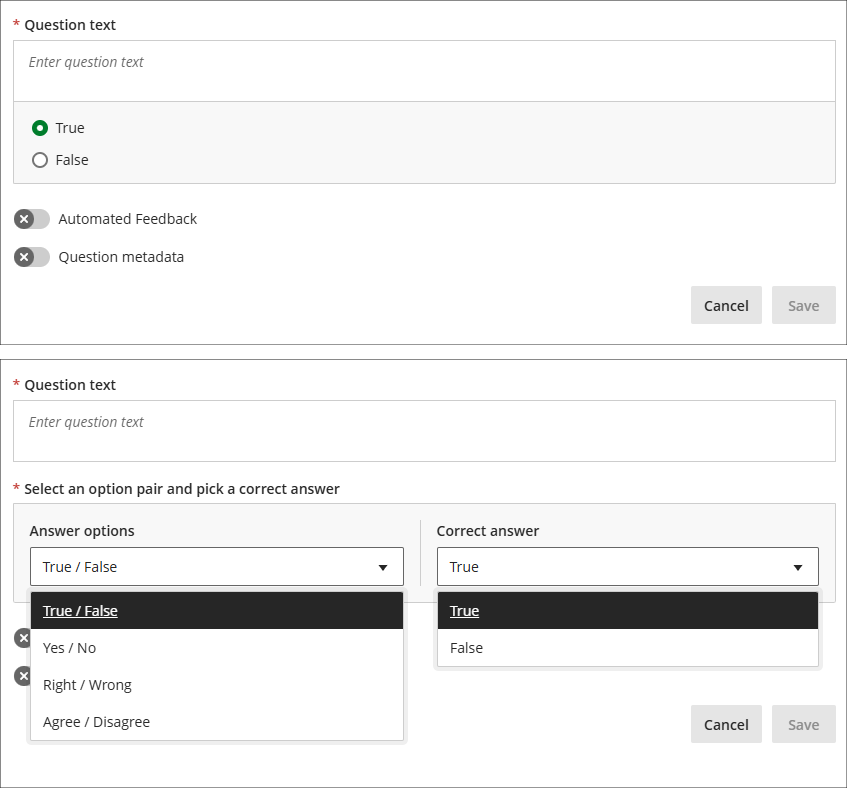
More information about Ultra tests is available from: Learning Technology Team – Ultra Workflow 3: Blackboard Test
Improved options for multiple option questions in Ultra tests
The January upgrade will introduce a new option for staff setting up multiple option questions, allowing staff to define the maximum number of options that students can select (currently, students can select up to as many options as there are). When setting up multiple option questions, staff will need to specify: 1) the options which can be selected; 2) which of these options are correct, and; 3) the maximum number options that can be selected (this must be between one and four). Students will see a display showing how many options can be selected, but not how many options are correct, so for a more straightforward test the number of correct and selectable options would be the same, but for a more challenging test the maximum number of selectable options could exceed the number of correct options. And, depending on the level of challenge required, staff may or may not choose to disclose to students that the number of selectable options is greater than the number of correct options. Combined with the option to use negative marking, the multiple option question is an extremely versatile question type.
The following screenshot shows a complex multiple option question setup, with two correct answers but the option to choose up to three options. Additionally, partial and negative credit is enabled and a negative overall score is allowed, meaning that students can score between 100% and -150% of the question score.
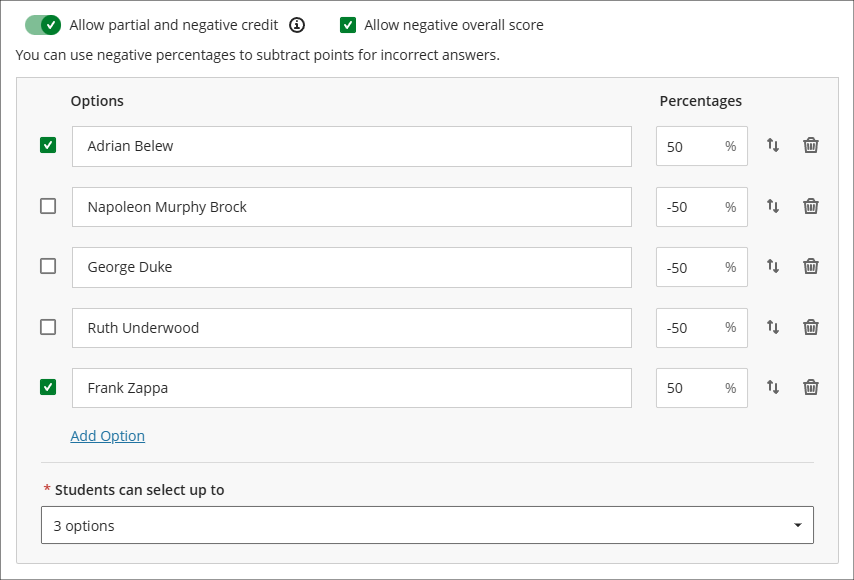
Where a multiple choice rather than a multiple option question is preferred, this can be set by specifying only one correct option and only allowing students to select one option. Where these settings are selected the question will display to students with radio buttons rather than checkboxes.
The following screenshot shows how the multiple option/choice questions display to students. Question 1 is the student view of the question already shown in the screenshot above. How many options can be selected is always shown to students, but how many correct answers there are is not displayed to students, so if you wanted to have questions which allowed more options to be selected than there are correct options, you might want to consider letting students know about this in the test instructions. Question 2 shows the display of a multiple option question with one correct option and only one option able to be selected.
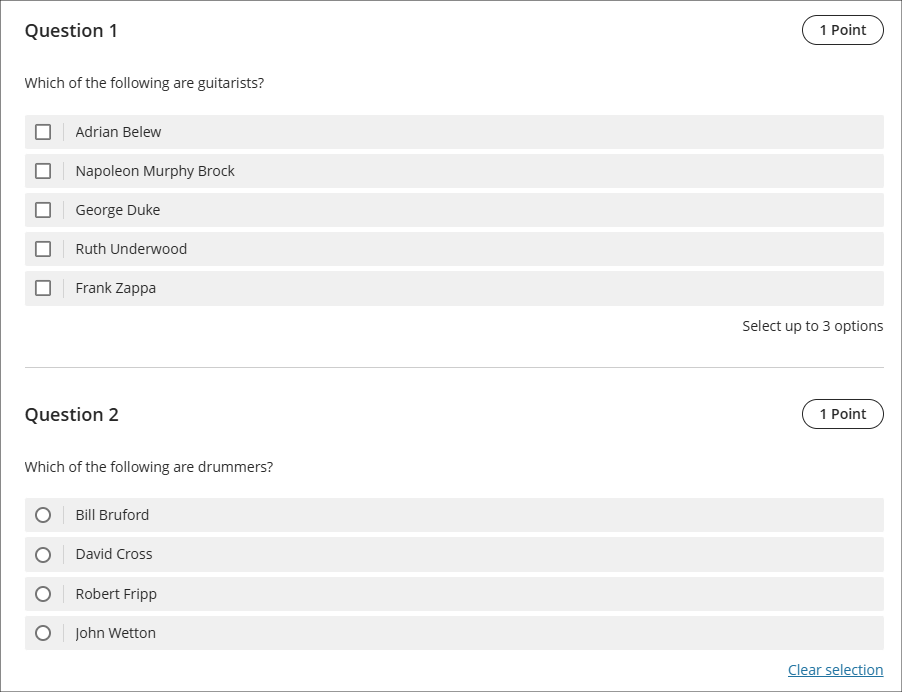
More information about Ultra tests is available from: Learning Technology Team – Ultra Workflow 3: Blackboard Test
Ultra document block layout improvement
To improve usability and accessibility, the January upgrade will include a restructured menu for the Ultra document block layout. Currently, all options for changing the row, size, or position of a block are in a single dropdown list. Following the upgrade these options will be organised by row, size, and position. The following screenshot shows the pre-upgrade menu (shown on the left) and the post-upgrade menu (shown on the right).
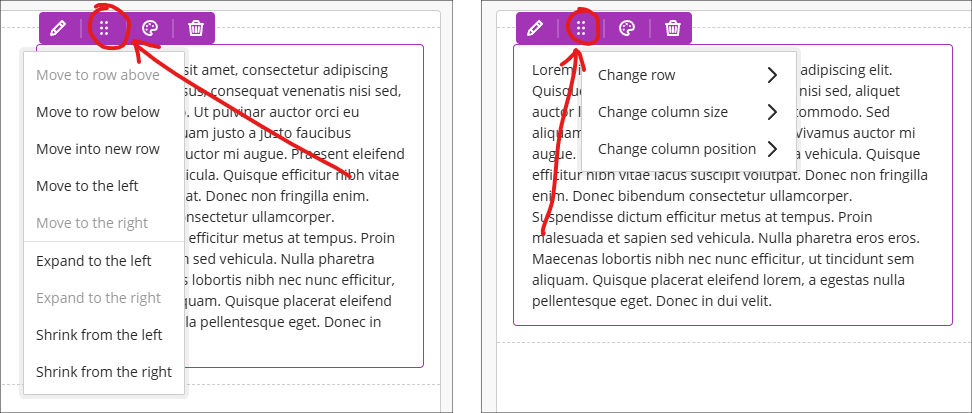
More information about using Ultra documents is available from: Blackboard Help – Documents
Learning technology / NILE community group
Staff who are interested in finding out more about learning technologies and NILE are invited to join the Learning Technology / NILE Community Group on the University’s Engage platform. The purpose of the community is to share information and good practice concerning the use of learning technologies at UON. When joining the community, if you are prompted to login please use your usual UON staff username and password. By joining the Learning Technology / NILE Community you will receive calendar invitations to our regular live community events:
Join the Learning Technology / NILE Community Group
More information
As ever, please get in touch with your learning technologist if you would like any more information about the new features available in this month’s upgrade: Who is my learning technologist?
The new features in this month’s Blackboard’s upgrade will be available from Friday 5th December. This month’s upgrade includes the following new/improved features to Ultra courses:
- Change to staff view of learning modules
- Set release conditions for opened or started non-assessed content items
- Specify participation requirements for discussions
Also of interest may be the following:
- New NILE training course: Enhancing and measuring student engagement through NILE tools
- Coming soon: New Blackboard Help site
- Coming soon: Improved look for Ultra courses
- Coming soon: Automatically send messages to students based on course-level rules
Change to staff view of learning modules
Currently, when staff select an item in a learning module the item opens in full page view. This means that staff cannot easily see and navigate between the items they have added to their learning modules, as they have to open and close each item individually. December’s upgrade will add in a collapsible contents menu to the staff view of learning modules, allowing much easier navigation between items, either by selection from the contents menu, or by using the previous and next buttons. This upgrade effectively replicates for staff the student view of learning modules, meaning that with the exception of the ‘Edit content’ button, staff now see learning modules as their students see them.
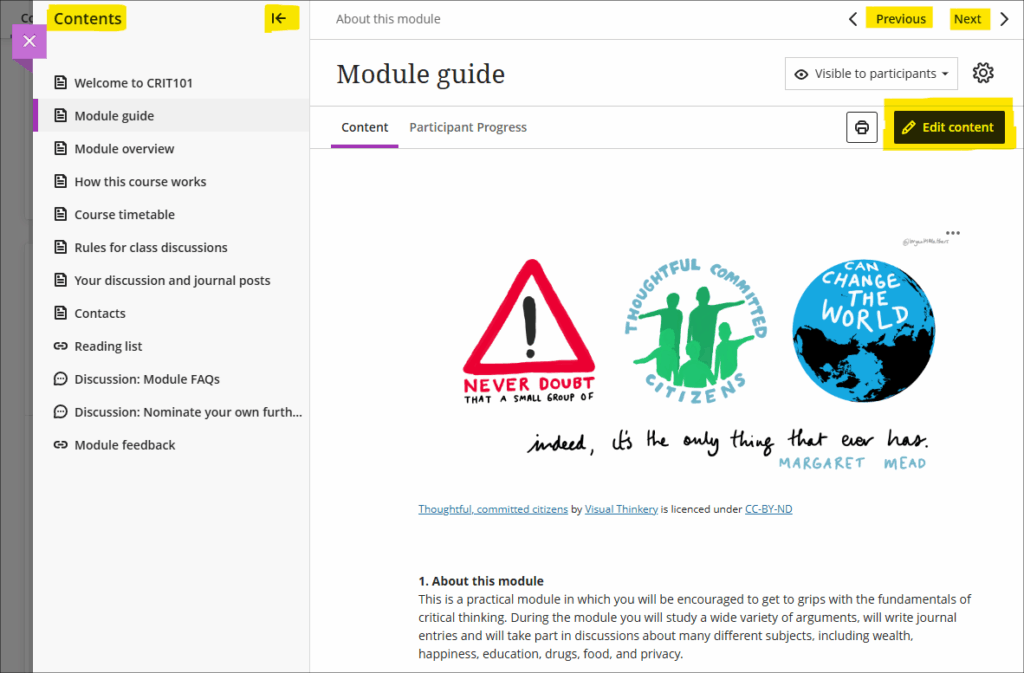
For more information about learning module see: Blackboard Help – Learning Modules
Set release conditions for opened or started non-assessed content items
A seeming small, but nevertheless rather interesting new option for using release conditions will be available in the December upgrade. To date, release conditions have only been available to set with time/date restrictions (i.e., available before, after, or between such-and-such a time) or against items which have an entry in the gradebook (i.e., available to students who have scored above, below, or between such-and-such marks). The December upgrade makes use of the fact that Blackboard courses keep track of which students have viewed which content items, and this can now be used in conjunction with release conditions to make content selectively available only to students who have viewed certain content items. For example, in the following screenshot I have set my assignment submission point to be available only to those students who have opened the assignment instructions:
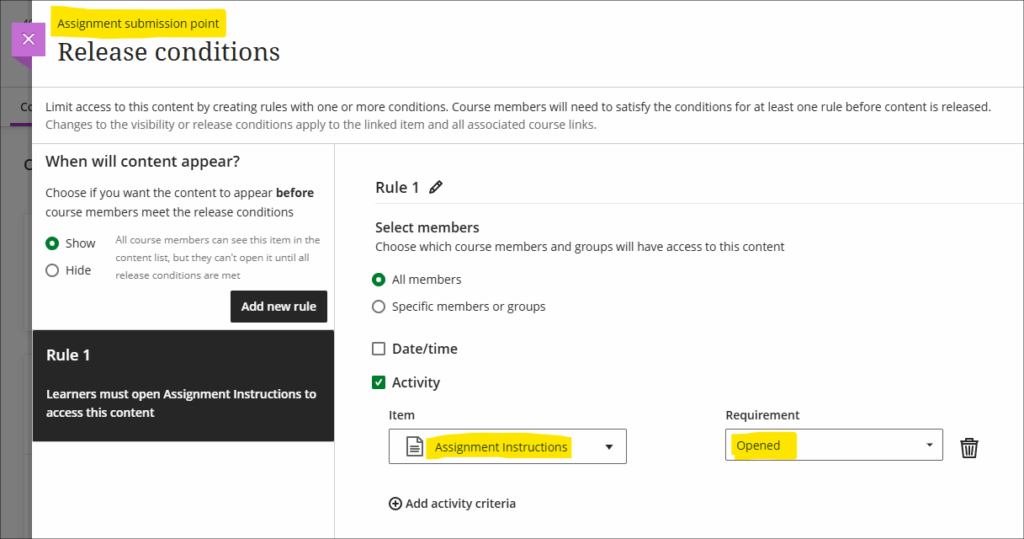
Multiple release conditions can also be used. In the next example, my assignment submission point is now only available to students who have: 1) opened the assignment instructions; 2) submitted a pre-assignment checklist, and; 3) submitted and received a mark for their draft assignment:
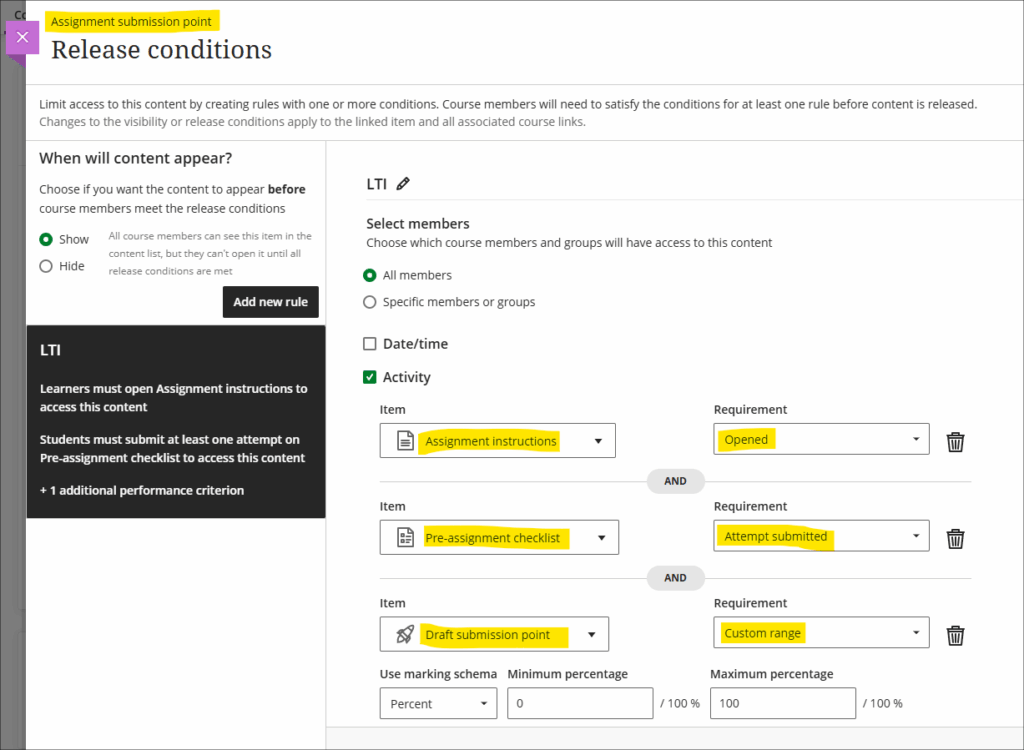
In both of the above examples, under ‘When will content appear?’ (towards the top left of the screenshot), the option has been left in the default state of ‘Show’. This means that students will still see the assignment submission point, but it will remain locked until the release conditions are met. The student view of the above would thus be as follows:
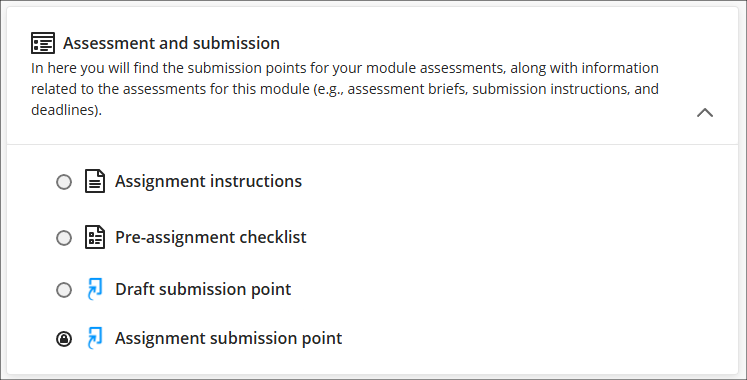
You could, of course, use a cascading set of release conditions to make sure that in order to complete the second item, students have to complete the first, and so on and so forth, if you would prefer that the tasks were completed in a particular order.
More information about using release conditions is available from: Blackboard Help – Content Release Conditions
Specify participation requirements for discussions
Following December’s upgrade staff will be able to specify participation requirements for marked discussions. The options available allow staff to choose the number of responses, from one to five, and whether these should be posts, replies, or a mixture of both.
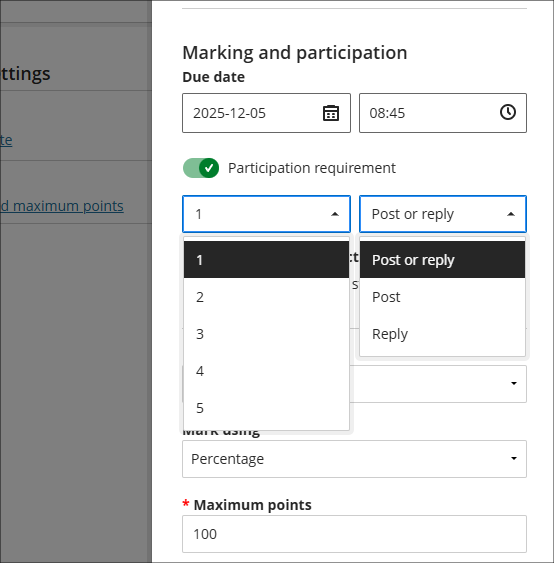
If specified, the participation requirements will automatically be shown to students, and a visual indicator provided which shows their progress will be displayed.
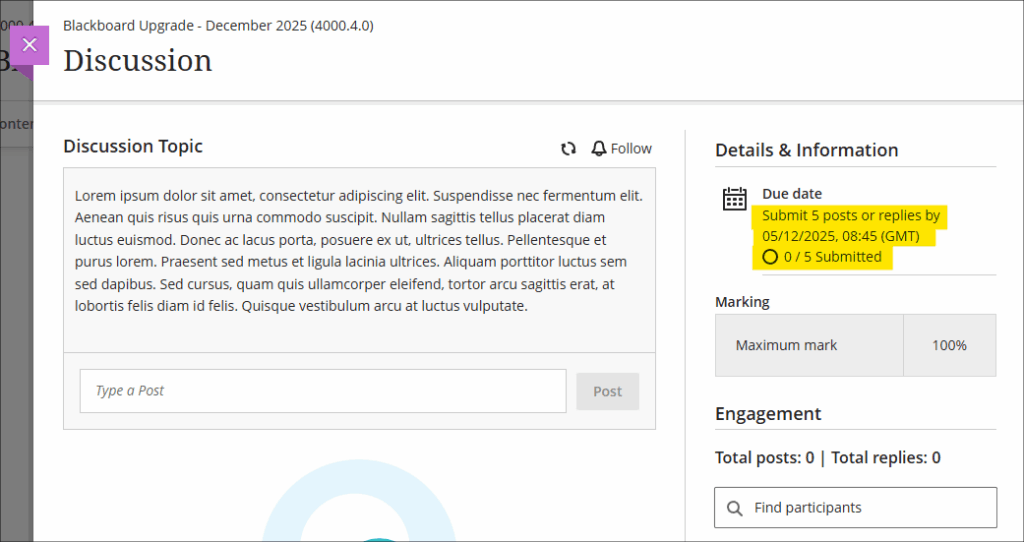
Setting participation requirements does not affect any gradebook settings. For example, if a student has not met the minimum participation requirements this will not affect whether or not the discussion can be marked.
More information about setting up and using discussions is available from: Blackboard Help – Discussions
New NILE training workshop: Enhancing and measuring student engagement through NILE tools
A new NILE workshop, focusing on the student engagement analytics available in NILE courses, is now available. The workshop will enable staff to:
- gain confidence when applying NILE tools to monitor and improve the student learning experience;
- explore the tools in NILE (Blackboard Ultra) that provide insights into student engagement;
- interpret learner activity from a demonstration site with dummy student data;
- evaluate patterns of participation to identify strengths, areas for improvement and develop strategies for enhancing engagement;
- reflect on how students interact with the virtual learning environment and consider how this evidence can inform their teaching practice and module design.
View dates and book onto Enhancing and measuring student engagement through NILE tools
Coming soon: Updated Blackboard Help site
Blackboard are planning a major overhaul of their help site, help.blackboard.com, which will go live on 10 December 2025. Redirects will be in place, but it is possible that some links may not successfully redirect, so if you have any links beginning help.blackboard.com please check them on or shortly after 10 December. If you would like to see what the new site will look like, you can view the preview version of the new Blackboard Help site.
Coming soon: Improved look for Ultra courses
Friday 9th January 2026 will see an improved look for Ultra courses, as shown in the screenshot below. The upgrade is designed to improve top-level navigation around NILE and to make better use of screen space. As part of the upgrade, all NILE courses will now have a course banner, although this can easily be changed by staff. Please note that this is a required update by Blackboard and not something that individual institutions have any control over.
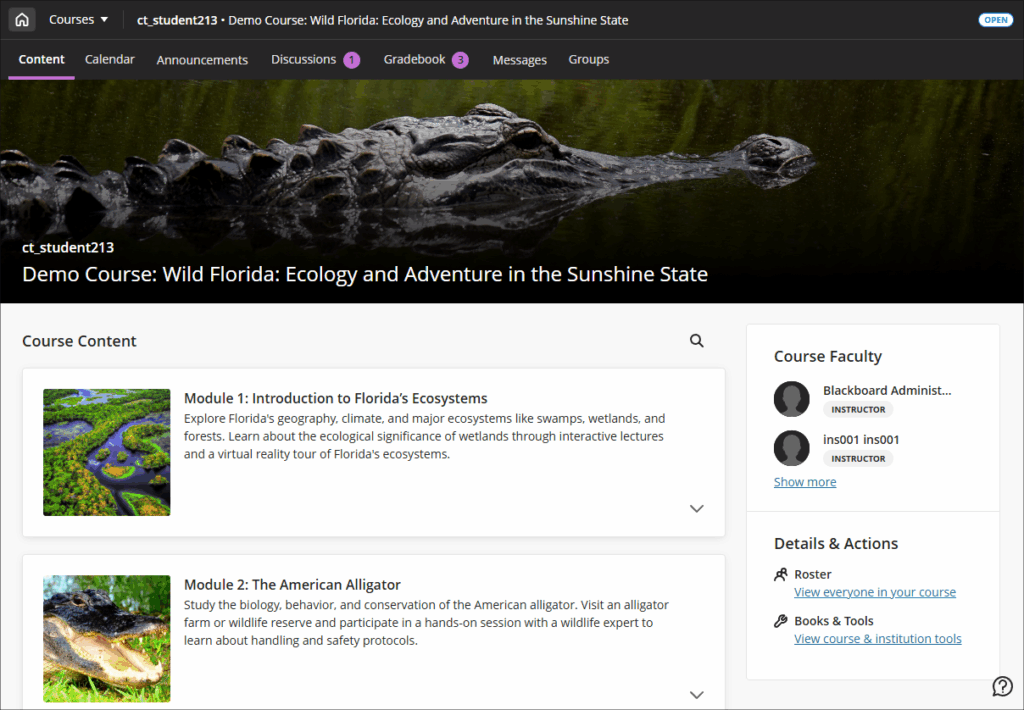
Full details of the changes are available in the following document:
More information is available from:
- Ultra courses system navigation update – January 2026 (video: 1m 43s)
- How to change your NILE course banner (video: 0m 58s)
Coming soon: Automatically send messages to students based on course-level rules
Semester two will see the introduction of a new tool in Ultra courses; Anthology’s virtual assistant. With this upgrade staff will be able to automate sending messages to students based on assessment scores.
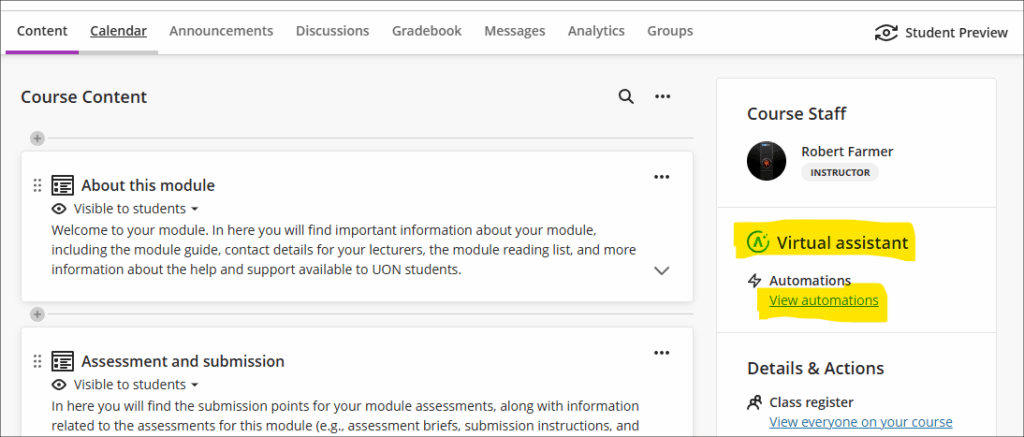
In this initial release staff can select to send messages to students based on the following criteria:
- Students who have received a mark above above a given percentage in an assessment;
- Students who have received a mark below a given percentage in an assessment;
- Students who have received any mark at all for an assessments (i.e., have a mark of 0% or more).
Staff can set up multiple automations, so can, for example, send automated supportive messages to students who have received a fail for an assessment, and also send congratulatory messages to students who have received a high score for an assessment. However, please note that in this initial release there is currently no option to select ‘between’ marks, only marks above or below certain values can be chosen.
More information about automations is available from: Blackboard Help – Automations
Learning technology / NILE community group
Staff who are interested in finding out more about learning technologies and NILE are invited to join the Learning Technology / NILE Community Group on the University’s Engage platform. The purpose of the community is to share information and good practice concerning the use of learning technologies at UON. When joining the community, if you are prompted to login please use your usual UON staff username and password. By joining the Learning Technology / NILE Community you will receive calendar invitations to our regular live community events:
Join the Learning Technology / NILE Community Group
More information
As ever, please get in touch with your learning technologist if you would like any more information about the new features available in this month’s upgrade: Who is my learning technologist?
The new features in this month’s Blackboard’s upgrade will be available from Friday 7th November. This month’s upgrade includes the following new/improved features to Ultra courses:
- Bulk edit question points in tests
- Improved navigation for Blackboard items from gradebook column headers
- Display of percentage grades in NILE
- Turnitin Feedback Studio: iPad app deprecation
- Fix your content day
Bulk edit question points in tests
Currently, the points value of test questions can only be changed on a per-question basis. Following the November upgrade, staff will be able to bulk change the points value of test questions. The bulk change options will allow staff to select all questions in the test, or filter and select by question type, or select individual questions.
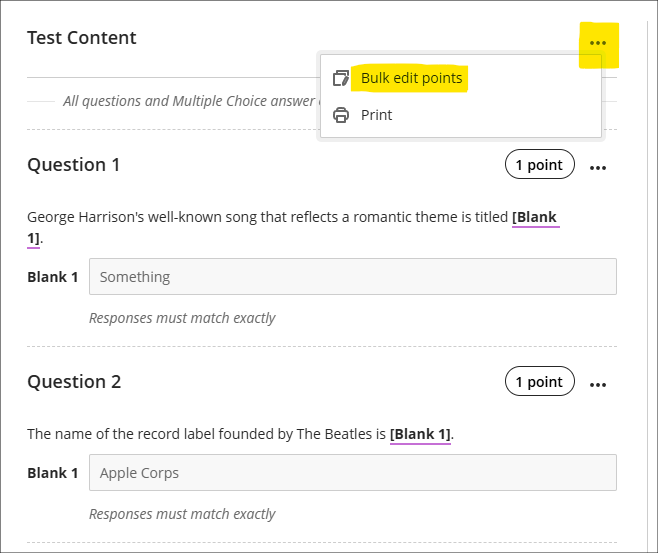
More information about using tests is available at: Learning Technology Team – Ultra Workflow 3: Blackboard Test
Improved navigation for Blackboard items from gradebook column headers
Please note that the following does not apply to Turnitin assignments, only to Blackboard items (assignments, tests, forms, assessed discussions and journals, AI conversations, plus manually created gradebook items, calculations, and total calculations) and SCORM items.
It is not currently possible when in ‘Marks’ view in the gradebook to view students’ submissions. To do this while in the gradebook, staff have to switch to ‘Markable Items’ view and select the submission from there. Following the upgrade, selecting the column header in ‘Marks’ view will, if accessing a Blackboard or SCORM item, offer a ‘View’ option which takes staff directly to the submissions.
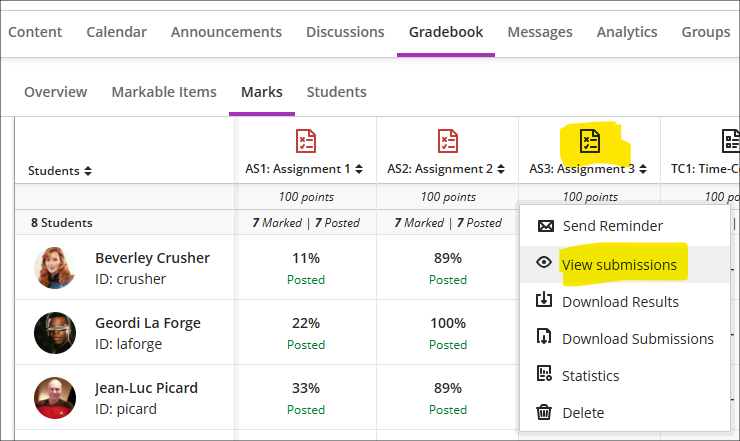
Display of percentage marks in NILE
Currently, percentage marks in NILE are displayed up to two decimal places. For most tutor-marked assignments this is not an issue because these are typically marked out of 100 and a whole number mark is awarded. However, for assignments not out of 100, and especially for computer-marked tests, etc., students often see their marks displayed to one or two decimal places. As SITS rounds non-whole number marks this means that there are situations where students’ marks in NILE are not identical with those in SITS. For example, the following marks in NILE would be displayed as whole numbers in SITS:
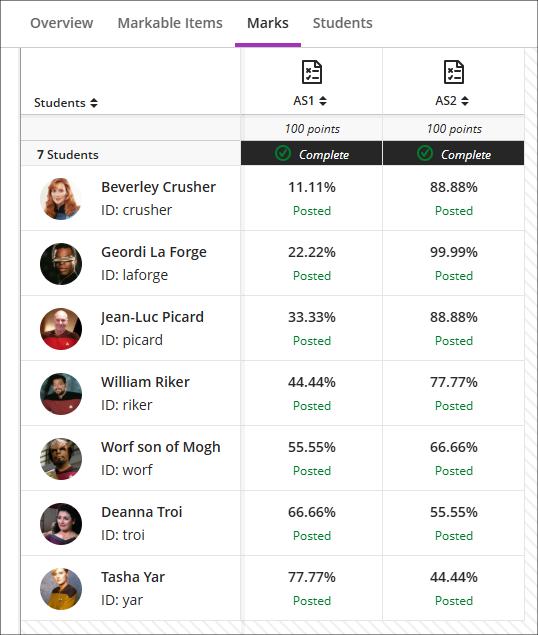
Following the November upgrade, NILE will apply the same rules as SITS (standard rounding rules) when dealing with non-whole number percentage marks in the gradebook, meaning that the marks displayed to students in NILE and those displayed in SITS will always be identical. Thus the marks show in the screenshot above will, following the upgrade, be displayed as follows:
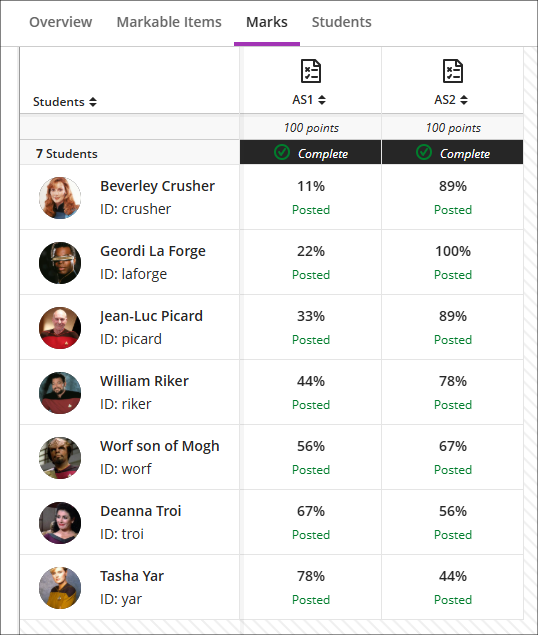
Turnitin Feedback Studio: iPad app Deprecation
Turnitin have announced that at the end of 2025 The Turnitin Feedback Studio iPad app will be retired and will no longer be available.
Fix your content day
At the University of Northampton, we’re once again pleased to join Anthology’s Fix Your Content Day – a 24-hour global event on Tuesday, November 18th, 2025 – aimed at creating more inclusive learning environment for all students. This is a brilliant initiative which encourages staff to improve the accessibility of digital course content using Blackboard Ally, which helps make NILE more inclusive, one fix at a time.
Find out more at: Learning Technology Blogs – Fix Your Content Day 2025
Learning technology / NILE community group
Staff who are interested in finding out more about learning technologies and NILE are invited to join the Learning Technology / NILE Community Group on the University’s Engage platform. The purpose of the community is to share information and good practice concerning the use of learning technologies at UON. When joining the community, if you are prompted to login please use your usual UON staff username and password. By joining the Learning Technology / NILE Community you will receive calendar invitations to our regular live community events:
Join the Learning Technology / NILE Community Group
More information
As ever, please get in touch with your learning technologist if you would like any more information about the new features available in this month’s upgrade: Who is my learning technologist?
The new features in this month’s Blackboard’s upgrade will be available from Friday 3rd October. This month’s upgrade includes the following new/improved features to Ultra courses:
Improved student view of fill in the blanks test questions
Following the October upgrade, the student view of fill in the blanks test questions will be improved so that the students’ responses are placed in situ, rather than as a list at end of the question.
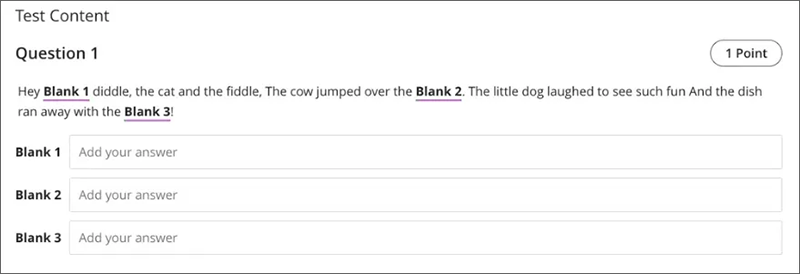

More information on the different types of questions that can be used in tests is available from: Blackboard Help – Question Types
Add metadata to test questions
October’s upgrade will allow staff using tests in NILE to add question metadata to their test questions via the use of tags. Metadata tags will be visible during question creation and editing and can be used to filter questions when reusing or adding to pools. Tags can be added to questions in a test, or to undeployed questions in the question bank.
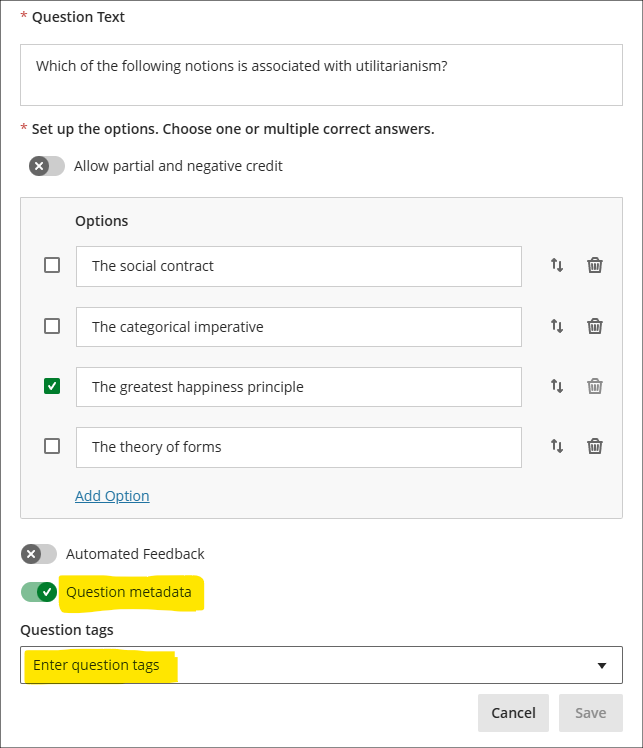
More information about setting up tests is available from: Blackboard Help – Create Tests
Learning technology / NILE community group
Staff who are interested in finding out more about learning technologies and NILE are invited to join the Learning Technology / NILE Community Group on the University’s Engage platform. The purpose of the community is to share information and good practice concerning the use of learning technologies at UON. When joining the community, if you are prompted to login please use your usual UON staff username and password. By joining the Learning Technology / NILE Community you will receive calendar invitations to our regular live community events:
Join the Learning Technology / NILE Community Group
More information
As ever, please get in touch with your learning technologist if you would like any more information about the new features available in this month’s upgrade: Who is my learning technologist?
The new features in this month’s Blackboard’s upgrade will be available from Friday 8th August. This month’s upgrade includes the following new/improved features to Ultra courses:
- Improved student experience with learning modules
- Copying content between NILE courses
- End of Life: Padlet LTI NILE integration
- End of Life: Assist tab in main NILE menu
Improved student experience with learning modules
Following the August upgrade, the student experience of learning modules will be improved with the addition of a collapsible navigation panel, allowing students to more easily move between the items in the learning module. Currently, while students can progress to the next and previous items in a learning module, they do not get a sense of where they are in the learning module, and nor can they jump back and forth between items from within the learning module.
The current student view of an item in a learning module is as follows:
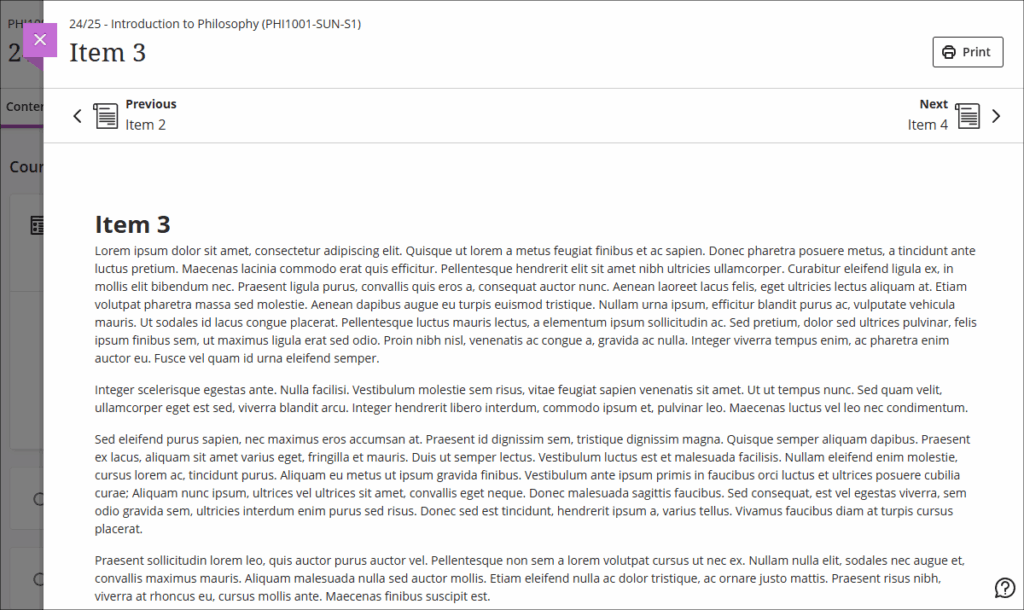
After the upgrade, all learning modules will automatically be upgraded to include a collapsible navigation panel, as shown in the screenshot below.
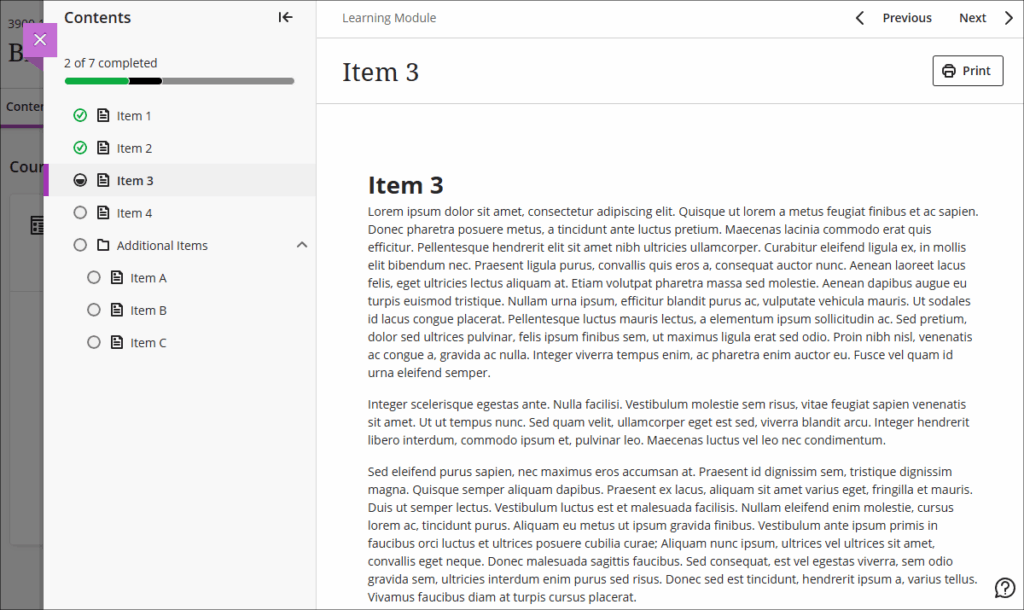
The new panel displays the contents of the learning module, allowing students to see where they are, jump between items, and mark items as completed from within the learning module. The ‘Previous’ and ‘Next’ buttons continue to appear, and where students are working on a smaller screen device, the panel can be collapsed (the arrow pointing left in the top right corner of the navigation panel), allowing the learning module items to be viewed full width. Where ‘Forced Sequence’ has been specified, students will still be required to progress through the items in order, but once they have done this and they will be able to easily move between any of the items that they have unlocked.
Staff who would like to see how their learning modules appear to students can switch into ‘Student Preview‘ mode and view all aspects of their course as their students will experience them.
More information about creating learning modules is available from: Blackboard Help – Create Learning Module
Copying content between NILE courses
Staff need to take particular care when copying content from an old NILE course into a new one, because incorrectly copying between Ultra courses will cause problems later on. To help with this process we have produced detailed guidance on how to safely copy content between Ultra courses, which is available at: Learning Technology Team – How do I copy content between NILE Ultra courses?
And we’ve also made a video walkthrough of the process:
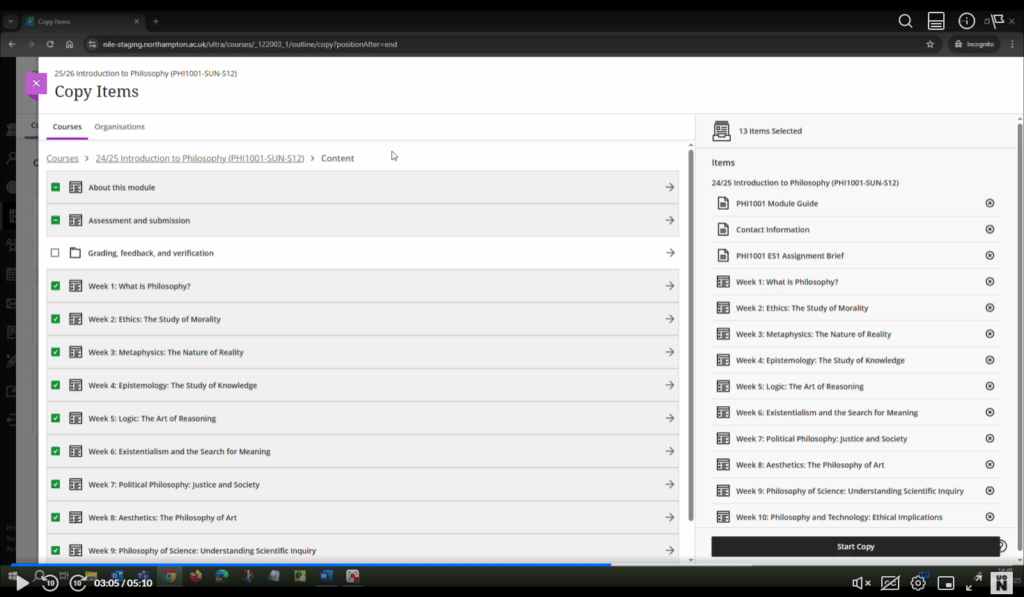
End of Life: Padlet LTI NILE integration
Important Note: Padlet itself is NOT being removed – only the method of sharing Padlets with students is changing.
On the 8th of September 2025 Padlet will be removed from the Content Market in NILE, meaning that all links to existing Padlets which have been embedded in NILE courses via the Content Market will stop working and will become automatically hidden from students.
UON staff can continue to use Padlet with their students, but staff will now need to access Padlet via https://uon1.padlet.org (selecting ‘Continue with Microsoft’ and entering their UON username and password) and share their Padlets in NILE via web links rather than using the Content Market. No other Padlet functionality will be affected, and students will not need to login to Padlet to be able to contribute to Padlets that have been linked from NILE courses using web links.
More information about logging in, setting up and using Padlet is available from: Learning Technology Team – Padlet
More information about creating web links in NILE courses is available from: Blackboard Help – Web Links
End of Life: Assist tab in main NILE menu
Blackboard have recently announced the end of life for the Assist tab which appears in the main NILE menu and which provides students with information about University support services, etc. The Assist tab will be removed from NILE on the 8th of September 2025.
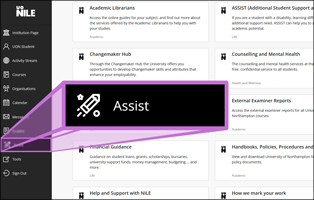
In order to provide students with information in NILE about the University’s support services, the information which currently appears in the Assist tab now appears in all 25/26 programme and module-level NILE courses in an item called ‘Help and support for UON students’*. In programme-level courses this is in the ‘My programme’ area of the course and in module-level courses this is in the ‘About this module’ area of the course.
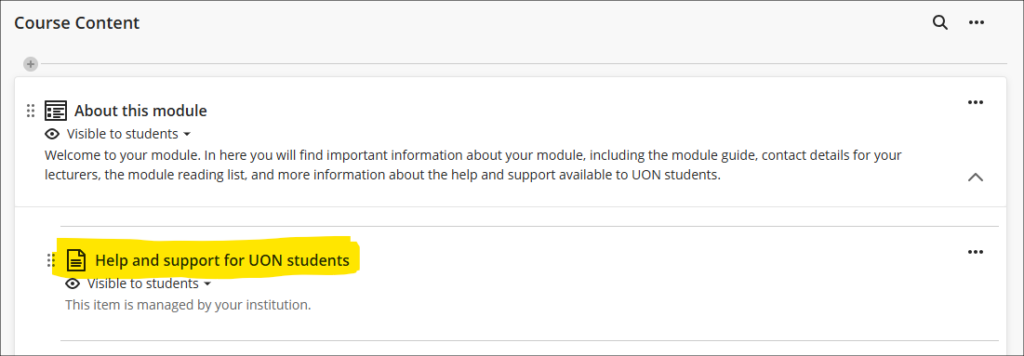
Please note that the ‘Help and support for UON students’ item cannot be edited by staff as it is managed and maintained centrally.
*In courses taught by partners the item is called ‘Help and support for students studying with partner institutions’ and only includes information relevant to partner students.
Learning technology / NILE community group
Staff who are interested in finding out more about learning technologies and NILE are invited to join the Learning Technology / NILE Community Group on the University’s Engage platform. The purpose of the community is to share information and good practice concerning the use of learning technologies at UON. When joining the community, if you are prompted to login please use your usual UON staff username and password. By joining the Learning Technology / NILE Community you will receive calendar invitations to our regular live community events:
Join the Learning Technology / NILE Community Group
More information
As ever, please get in touch with your learning technologist if you would like any more information about the new features available in this month’s upgrade: Who is my learning technologist?
The new features in this month’s Blackboard’s upgrade will be available from Friday 4th July. This month’s upgrade includes the following new/improved features to Ultra courses:
- New 25/26 NILE courses now available
- Review student engagement with announcements
- Add captions to image blocks in Ultra documents
- Support for QTI question banks import
- Enhanced pop-out rubric
- Change of terminology – grades to marks
- End of life notification: Padlet LTI NILE integration
- End of life notification: Assist tab in main NILE menu
New 25/26 NILE courses now available
New module-level NILE courses for the 25/26 academic year are now available. Programme-level NILE courses are expected to be available by the 9th of July.
Full guidance about finding and setting up NILE courses is available from: Learning Technology Team – Getting your NILE courses set up and ready for teaching
Please take particular care if you are intending to copy content from an old NILE course into a new one as incorrectly copying between Ultra courses will cause problems. Guidance on how to safely copy content between Ultra courses is available from: Learning Technology Team – How do I copy content between NILE Ultra courses?
Review student engagement with announcements
While the current version of NILE shows how many students have viewed each announcement, no information is available about which particular students have and have not viewed an announcement. Following the July upgrade this information will be available by selecting the number of viewers.
Where announcements are also sent by email (i.e., when the ‘Send an email copy to recipients’ box is ticked when posting the announcement), please bear in mind that NILE is not able to determine whether or not students have read the emailed copy of the announcement. The announcement viewers information in NILE only records views for students who have opened the announcement in the NILE course.
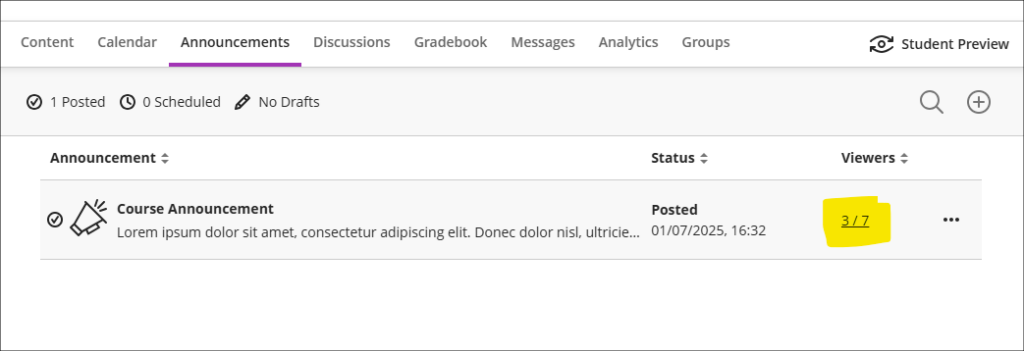
Upon selecting viewers, the course announcements panel will open, providing information about which students have read the announcement and which have not. The panel also allows staff to filter the list according to whether students have read the announcement or not, and from here staff can also select students individually or in bulk and can send a message.
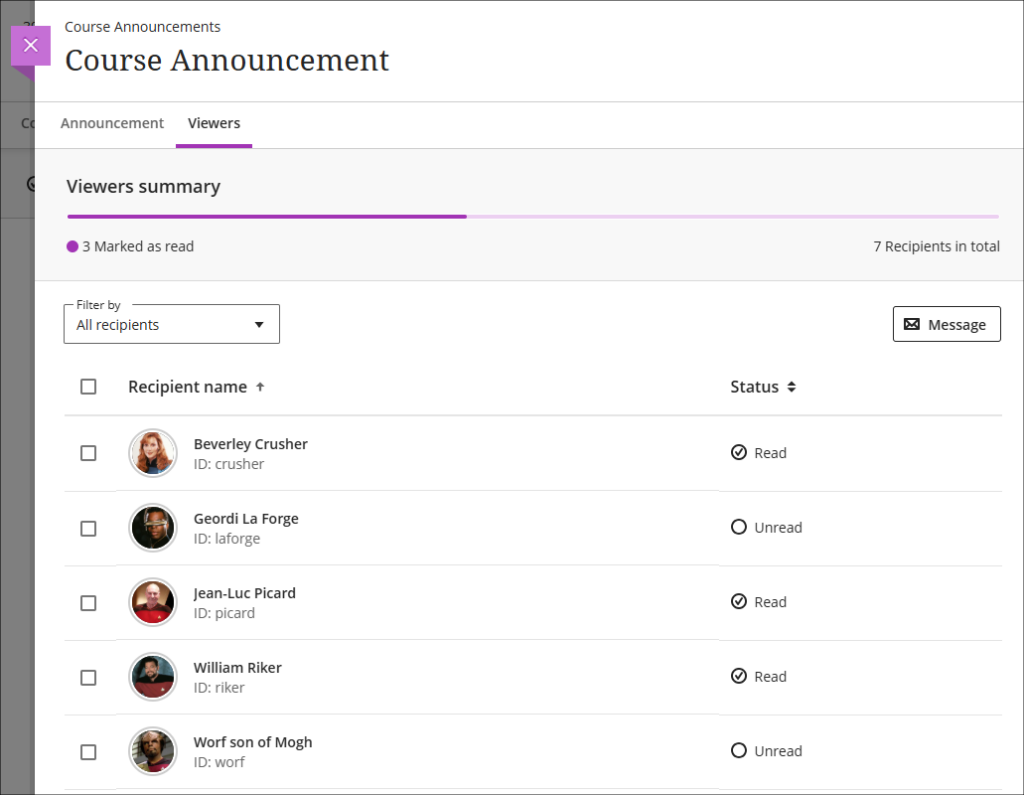
Add captions to image blocks in Ultra documents
Following Friday’s upgrade staff will be able to add captions to images in Ultra documents which have been added using the image block.
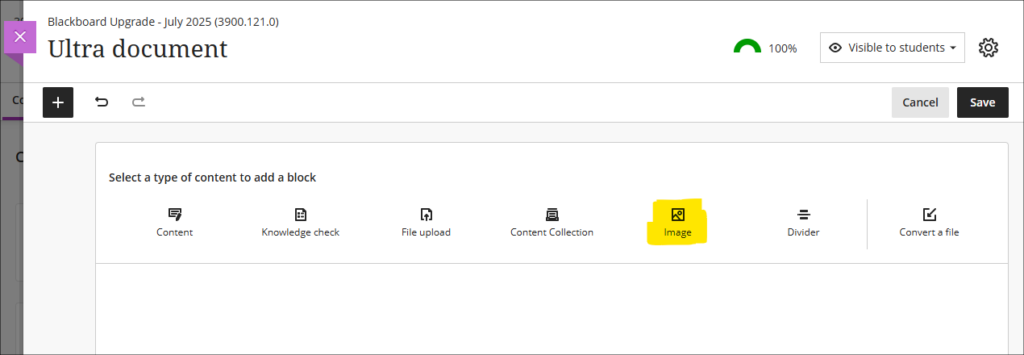
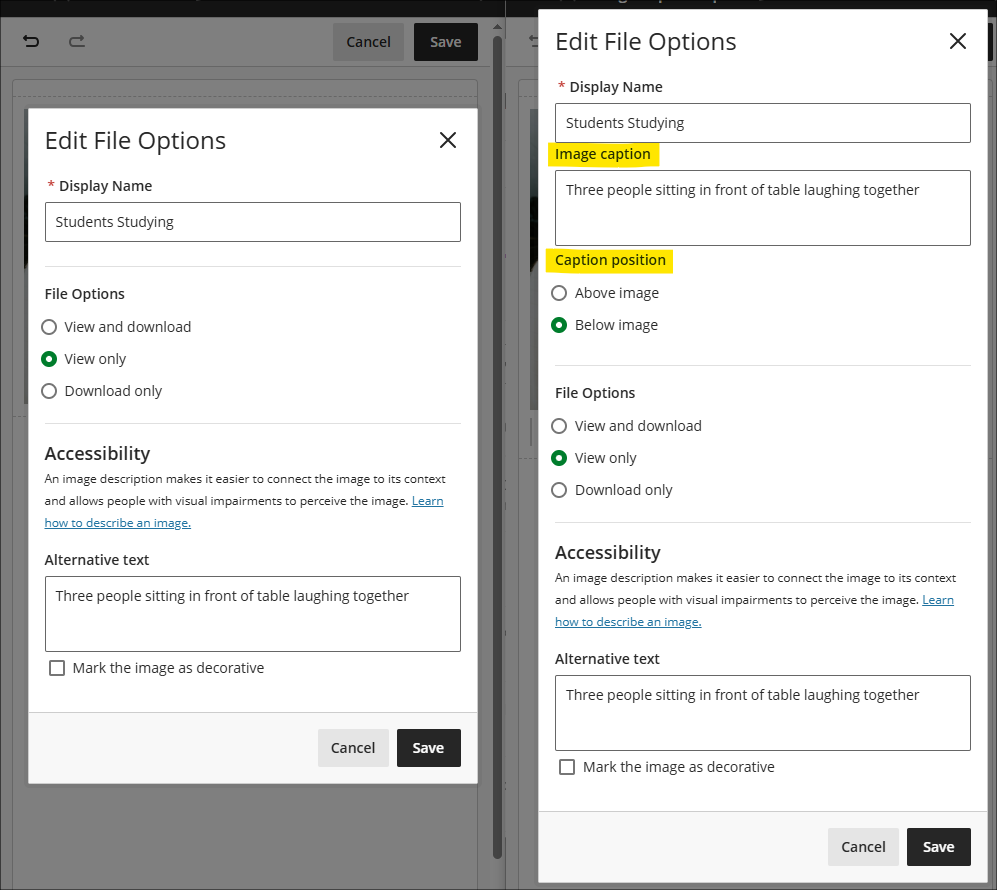
Support for QTI question banks import
Friday’s upgrade introduces support for importing test questions in QTI 2.1 format. Where staff have purchased banks of questions that are in the QTI format (which is the most common standard format for question banks) from third-party suppliers, these can now be uploaded directly into NILE courses via the Question Bank tool.
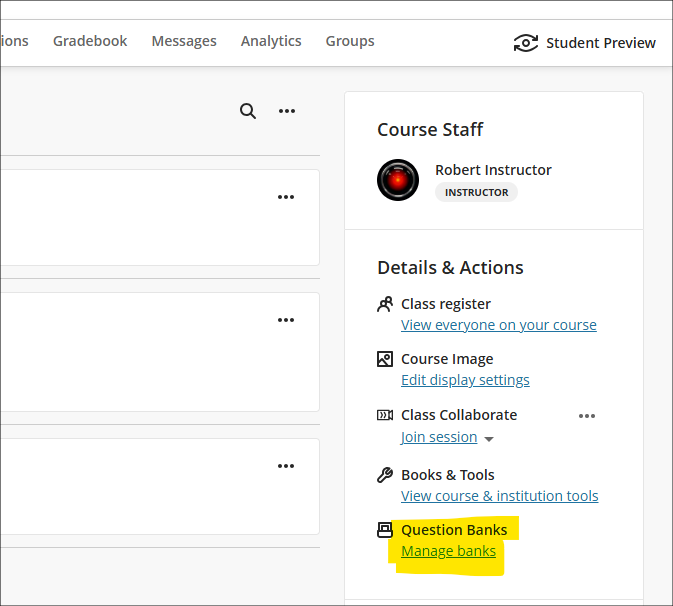
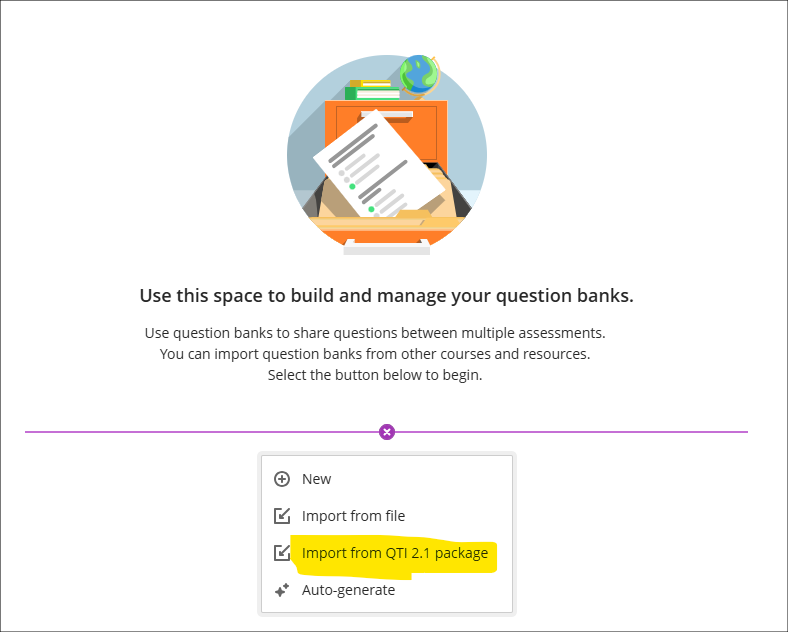
Enhanced pop-out rubric
The July upgrade will introduce the following changes to Blackboard rubrics:
- Attempting to close a pop-out rubric without saving the changes prompts a warning, reminding staff to save their changes;
- Selecting ‘Save’ no longer closes a pop-out rubric;
- Keyboard navigation will be improved, specifically arrow key and tab interaction, for the grid table.
Change of terminology – grades to marks
Following the terminology update to some of the grades transfer tools earlier this year, all remaining references in NILE to ‘grades’ will be replaced with ‘marks’ prior to the start of the 25/26 academic year.
End of Life: Padlet LTI NILE integration
Important Note: Padlet itself is NOT being removed – only the method of sharing Padlets with students is changing.
In early September 2025 Padlet will be removed from the Content Market in NILE, meaning that all links to existing Padlets which have been embedded in NILE courses via the Content Market will stop working and will become automatically hidden from students.
UON staff can continue to use Padlet with their students, but staff will now need to access Padlet via https://uon1.padlet.org (selecting ‘Continue with Microsoft’ and entering their UON username and password) and share their Padlets in NILE via web links rather than using the Content Market. No other Padlet functionality will be affected, and students will not need to login to Padlet to be able to contribute to Padlets that have been linked from NILE courses using web links.
More information about logging in, setting up and using Padlet is available from: Learning Technology Team – Padlet
More information about creating web links in NILE courses is available from: Blackboard Help – Web Links
End of Life: Assist tab in main NILE menu
Blackboard have recently announced the end of life for the Assist tab which appears in the main NILE menu and which provides students with information about University support services, etc. The Assist tab will be removed from NILE in early September 2025.

In order to provide students with information in NILE about the University’s support services, the information which currently appears in the Assist tab now appears in all 25/26 programme and module-level NILE courses in an item called ‘Help and support for UON students’*. In programme-level courses this is in the ‘My programme’ area of the course and in module-level courses this is in the ‘About this module’ area of the course.

Please note that the ‘Help and support for UON students’ item cannot be edited by staff as it is managed and maintained centrally.
*In courses taught by partners the item is called ‘Help and support for students studying with partner institutions’ and only includes information relevant to partner students.
Learning technology / NILE community group
Staff who are interested in finding out more about learning technologies and NILE are invited to join the Learning Technology / NILE Community Group on the University’s Engage platform. The purpose of the community is to share information and good practice concerning the use of learning technologies at UON. When joining the community, if you are prompted to login please use your usual UON staff username and password. By joining the Learning Technology / NILE Community you will receive calendar invitations to our regular live community events:
Join the Learning Technology / NILE Community Group
More information
As ever, please get in touch with your learning technologist if you would like any more information about the new features available in this month’s upgrade: Who is my learning technologist?
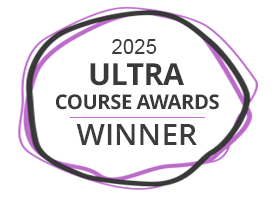
The Learning Technology Team would like to say a very big thank you and many congratulations to all the members of academic staff who are due to receive a NILE Ultra Course Award at the University’s Learning and Teaching Conference on Monday 16th June.
The ten recipients of a 2025 Ultra Course Award are:
- Maria Correia for BUS1024: Working Across Cultures
- Kiran Kaur for BUS2025: Reflections on International Experience
- Toby Tonkin for ENV1126: Life on Earth
- Caroline Nielsen for HIS3045: Seeing Ghosts? Death and the Supernatural in Britain: 1654 – 1918
- Muhammad Hijazy for HRMM094: Academic and Digital Skills for Professionals
- Hollie Townley for MID1029: Universal care needs applied to midwifery
- Alex Mouzakitis & Fiona Barrett for PHYM002: Evidence-based Cardiorespiratory Practice
- Alasdair Gordon-Finlayson for PSY1006: Becoming a Psychologist
- Charlotte Dann for PSY3053: Lifespan Development
- Mosavar Farahani & Danielle Jex for SLS2068: Clinical Immunology and Haematology
The Ultra Course Awards recognise staff who have created excellent Ultra courses for their students, and each course submitted for an award is reviewed by a panel of experts to ensure that it meets the award criteria, which are that the course:
- Follows the NILE Design Standards for Ultra Courses (https://libguides.northampton.ac.uk/learntech/staff/nile-design/nile-design-standards);
- Is clearly laid out and well-organised at the top level via the use of content containers (learning modules or folders), and that content items within top-level content containers are clearly named and easily identifiable for students, using sub-folders where necessary to organise content within the top-level content containers;
- Contains a range of content and activities for students to take part in.
In addition to reviewing the nominated courses, the panel also looked at students’ NILE engagement statistics to see whether courses that received an Ultra Course Award were used by students more than other courses. Comparing students’ engagement in NILE courses that received an Ultra Course Award in 2025 against the average of all active 24/25 NILE courses from semesters one and two, we found that students’ content interactions in courses that received an Ultra Course Award were almost three times greater than the average, and students were spending between two-and-a-half and three times more time in these courses than the average. Clearly, there are likely to be many reasons for students spending more time and being more active in courses that received an Ultra Course Award, but it is, we hope, heartening for Ultra Course Award recipients to know that the time spent designing and maintaining their NILE courses may have had a positive effect in this regard.
Information about the 2024 Ultra Course Awards can be found at: NILE Ultra Course Award Winners 2024
The new features in this month’s Blackboard’s upgrade will be available from Friday 6th June. This month’s upgrade includes the following new/improved features to Ultra courses:
- Add dividers to Ultra documents
- Enhanced appearance of knowledge checks results
- Tests: new jumbled sentence question type
- Discussion activity indicator for staff
- Grades transfer: option to select more items per page
- End of life notification for LearnSci LTI 1.1
- Learning technology / NILE community group
Add dividers to Ultra documents
Following June’s upgrade, staff will be able to use dividers in Ultra documents in order to enhance the look and the readability of these documents. In the following screenshot the divider tool is highlighted and a divider is in place between the text/image section and the knowledge check quiz.
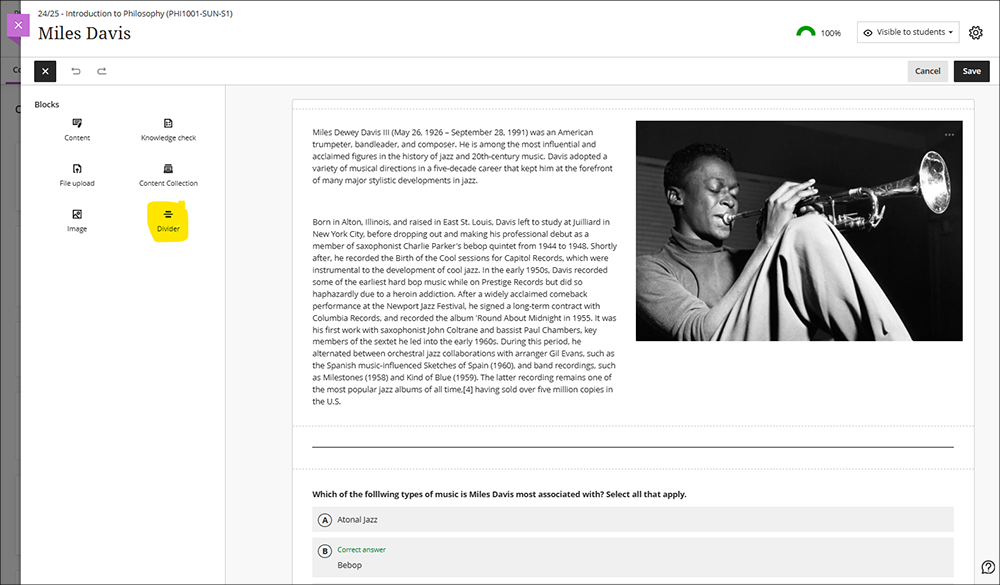
More information about using Ultra documents is available from: Blackboard Help – Create Documents
Enhanced appearance of knowledge checks results
After June’s upgrade, staff using knowledge check quizzes in Ultra documents will notice an improved display of the results of the quiz. In the screenshot below the top image shows the pre-upgrade view and the bottom image show the post-upgrade view of how the results of knowledge checks are presented to staff in their Ultra documents.
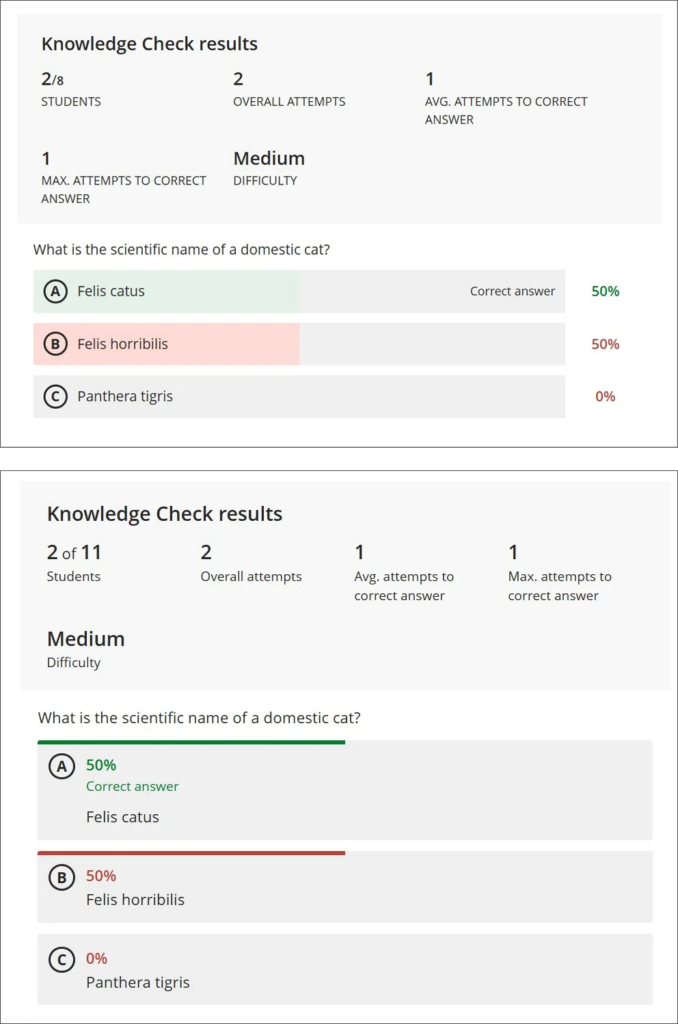
More information about creating knowledge check quizzes in Ultra documents is available from: Blackboard Help – Knowledge Checks in Blackboard Documents
Tests: new jumbled sentence question type
June’s upgrade will introduce a new question type to tests; the jumbled sentence question. When creating a jumbled sentence question, staff provide a block of text, enclosing the variables in square brackets and adding distractors as necessary (see screenshot below).
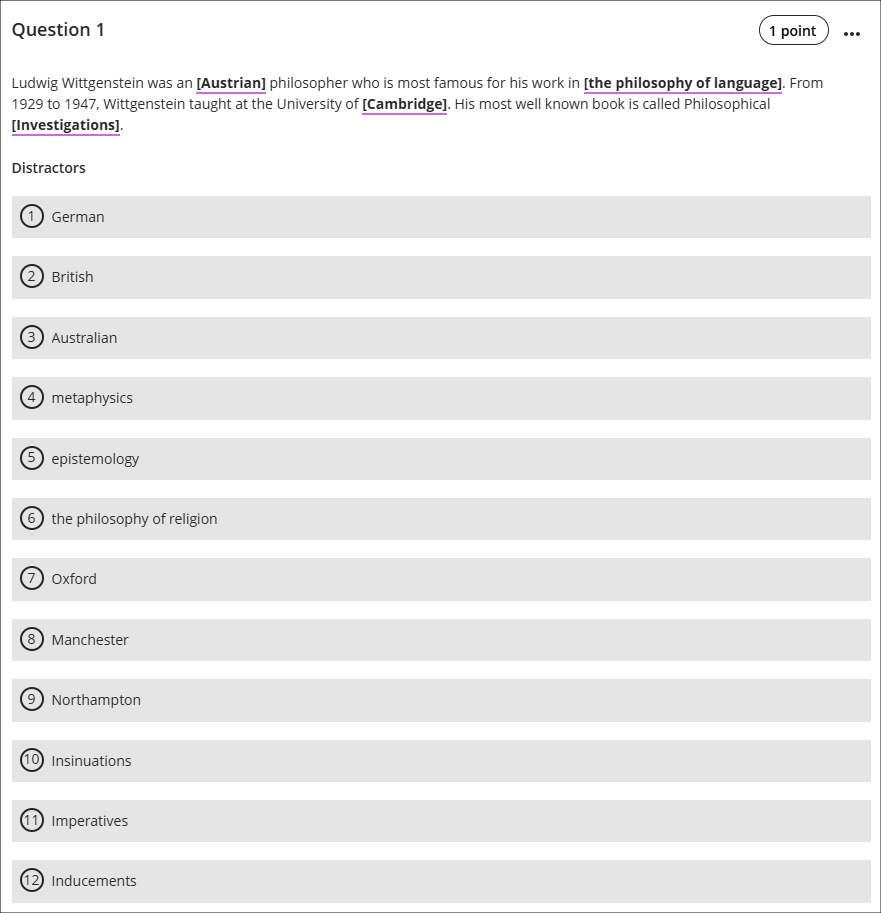
Please note the need to ensure that each variable is unique and has only one possible correct answer. For example, the following text will not work: “Wittgenstein is most famous for his work in the philosophies of [language], [mind], and [logic].” This is because a student would have no way of knowing in which order to put the variables ‘language’, ‘mind’, and ‘logic’ in their reponse, and would, for example, unfairly score 0% for the response, “Wittgenstein is most famous for his work in the philosophies of logic, language, and mind”.
When completing a jumbled sentence question, students will be able to choose any of the correct answers and distractors from the drop-down lists.

As well as being able to create jumbled sentence questions themselves, staff can also auto-generate jumbled sentence questions (and many other test question types) using the AI Design Assistant.
More information about creating tests is available from: Blackboard Help – Create Tests
More information about auto-generating test questions is available from: AI Question Generation in Blackboard
Discussion activity indicator for staff
Following the June upgrade, staff who use discussions in their courses will see an indicator in the course tools menu showing whether they have any discussions with unread posts. The indicator will display the number of discussions with new/unread posts, not the total number of new/unread posts in the discussions.
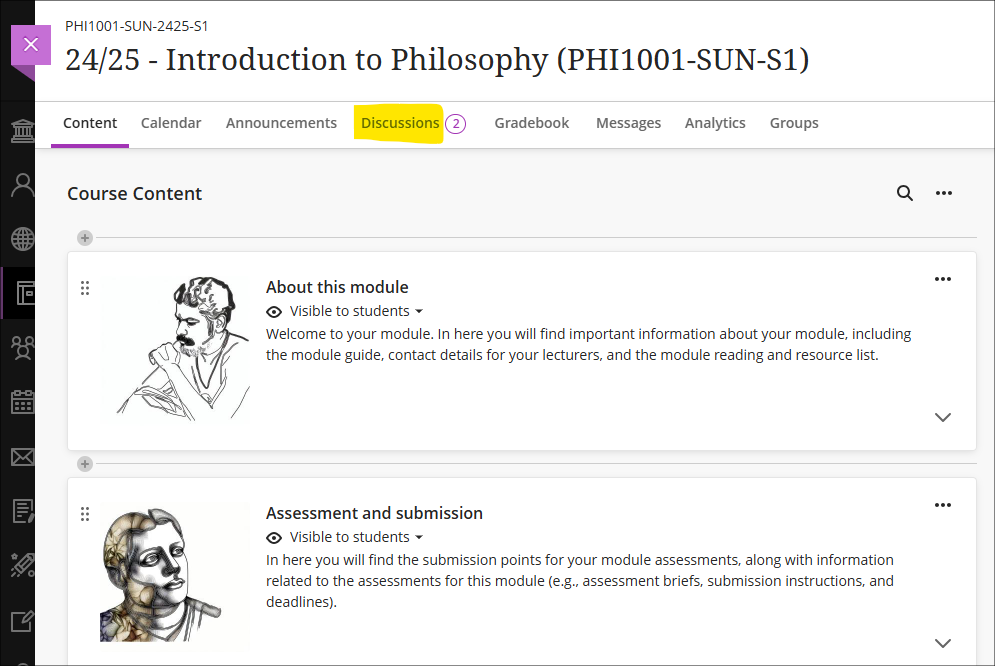
Once in the discussions tab the discussions which have unread posts will be flagged with the unread posts indicator.
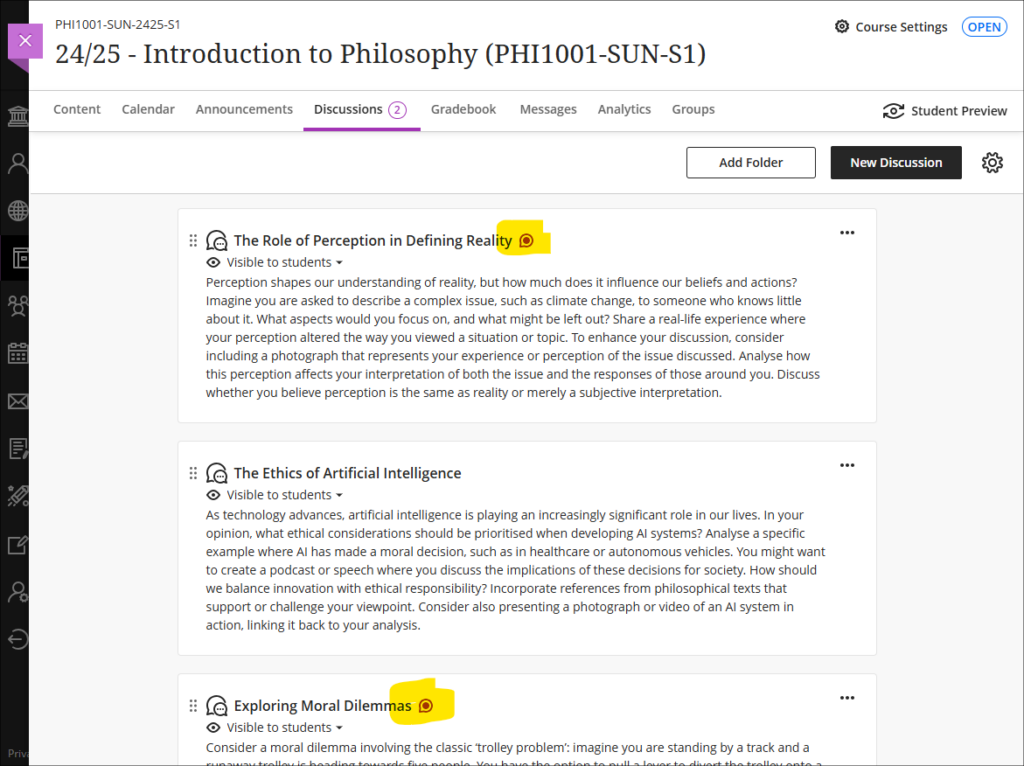
Staff (and students) can also keep track of discussions by accessing the discussion and using the ‘Follow’ option. This will send notifications via email of posts and replies to a discussion.
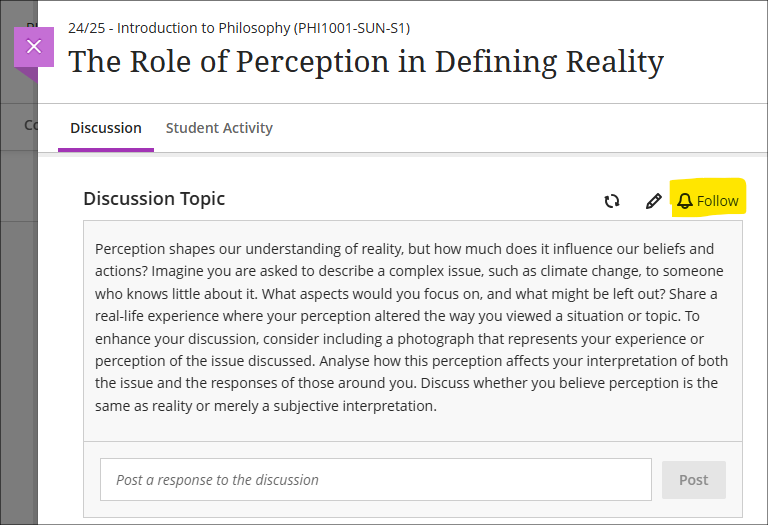
More information about discussions is available from: Blackboard Help – Create Discussions
Grades transfer: option to select more items per page
When sending grades to SITS, staff can now choose to display 10, 50, or 100 items per page in the approval workflow. This option is available now.
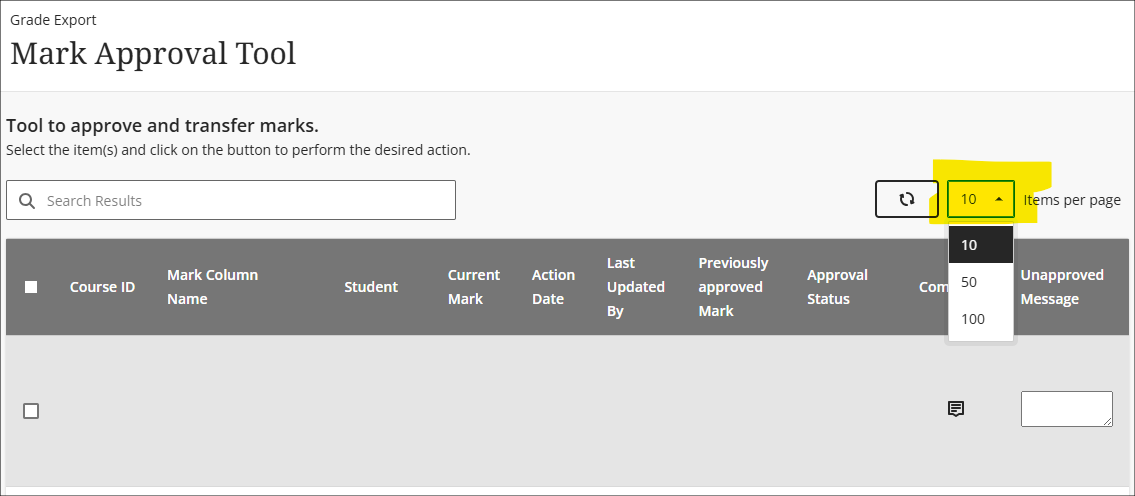
More information about the grades transfer process is available at: Learning Technology Team – Transferring grades from NILE to SITS
End of life notification for LearnSci LTI 1.1
Following on from LearnSci’s implementation of the LTI 1.3 method of adding LearnSci resources to NILE Ultra courses, LearnSci have advised that resources added using the old LTI 1.1 method will stop working on 1 September 2025. LearnSci resources added to Ultra courses using the LTI 1.1 method will have been added via ‘+ Create > Teaching tools with LTI connection’, whereas resources added via the LTI 1.3 method will have been added using ‘+ Content Market > LearnSci’.
A LearnSci resource added using the LTI 1.1 will look like the first link in the screenshots below, with the rocket next to the title. A LearnSci resource added using the LTI 1.3 will look like the second link, with the LearnSci icon next to the title. Once the LTI 1.1 is switched off the old links will appear to staff with a ‘This link is broken’ message and will be automatically hidden from students. LTI 1.3 links will be unaffected.
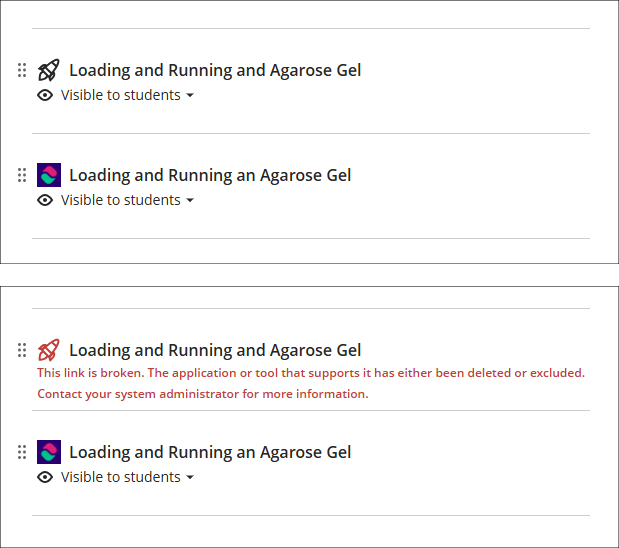
All LearnSci resources added using the LTI 1.1 will be fully functional until the end of August 2025. Where staff are using LearnSci resources for the 25/26 academic year they will need to ensure that when new NILE courses are being set up that any old LTI 1.1 links that have been copied over are removed and replaced with new 1.3 links. If staff want LearnSci resources to be available to students in old NILE courses any 1.1 links will need to be replaced with 1.3 links.
Learning technology / NILE community group
Staff who are interested in finding out more about learning technologies and NILE are invited to join the Learning Technology / NILE Community Group on the University’s Engage platform. The purpose of the community is to share information and good practice concerning the use of learning technologies at UON. When joining the community, if you are prompted to login please use your usual UON staff username and password. By joining the Learning Technology / NILE Community you will receive calendar invitations to our regular live community events:
Join the Learning Technology / NILE Community Group
More information
As ever, please get in touch with your learning technologist if you would like any more information about the new features available in this month’s upgrade: Who is my learning technologist?
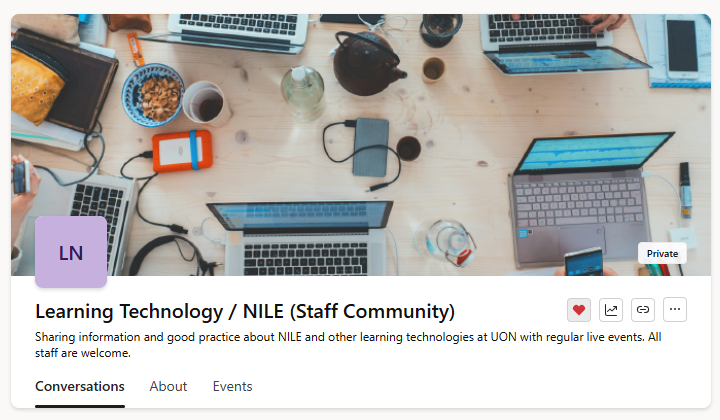
Staff who are interested in finding out more about learning technologies and NILE are invited to join the Learning Technology / NILE Community Group on the University’s Engage platform. The purpose of the community is to share information and good practice concerning the use of learning technologies at UON. When joining the community, if you are prompted to login please use your usual UON staff username and password.
By joining the Learning Technology / NILE Community you will receive calendar invitations to our regular live community events:
Community Update: A monthly meeting to update members about what’s new in NILE, including discussion on how these new features might best be used. These meetings will also include opportunities for questions about the new features and will allow time for community members to discuss their use of NILE, including features that they would like to see in NILE in the future. These meetings will normally take place on or near to the update schedule of the main virtual learning environment platform, Blackboard Learn.
Community Matters: A bi-monthly meeting focused on a particular topic of interest to the community. These will be announced at least a month in advance and will take cues from members on each theme chosen for discussion.
Once you have joined, please consider subscribing to the community by email so that you receive notifications of upcoming events direct to your inbox.
Recent Posts
- Blackboard Upgrade – February 2026
- Blackboard Upgrade – January 2026
- Spotlight on Excellence: Bringing AI Conversations into Management Learning
- Blackboard Upgrade – December 2025
- Preparing for your Physiotherapy Apprenticeship Programme (PREP-PAP) by Fiona Barrett and Anna Smith
- Blackboard Upgrade – November 2025
- Fix Your Content Day 2025
- Blackboard Upgrade – October 2025
- Blackboard Upgrade – September 2025
- The potential student benefits of staying engaged with learning and teaching material
Tags
ABL Practitioner Stories Academic Skills Accessibility Active Blended Learning (ABL) ADE AI Artificial Intelligence Assessment Design Assessment Tools Blackboard Blackboard Learn Blackboard Upgrade Blended Learning Blogs CAIeRO Collaborate Collaboration Distance Learning Feedback FHES Flipped Learning iNorthampton iPad Kaltura Learner Experience MALT Mobile Newsletter NILE NILE Ultra Outside the box Panopto Presentations Quality Reflection SHED Submitting and Grading Electronically (SaGE) Turnitin Ultra Ultra Upgrade Update Updates Video Waterside XerteArchives
Site Admin

